|
restoring our biblical and constitutional foundations
|
| welcome |
Sunday, November 30
5:50 PM Listen to three testimonials about my wife.
5:45 PM This arrived yesterday:
I love this book!
(1 Thessalonians, that is.)
3:50 PM Where can you watch a first-rate play, enjoy a ride on the Metro, witness a Ferguson demonstration, ride Uber, and book a hotel room with Hotwire? Washington, DC, of course! I am fast becoming a big fan of the nation's capital. This is primarily because one of my daughters lives there. I tell you, Karen has this town wrapped around her little finger. She handled the Metro like she's lived in DC all her life. When we needed a ride, no problem -- her Uber app was ready to go. Dad needs to book a hotel room? No problem. Hotwire got me a room in a four-star hotel for cheap. To top things off, we got to attend a play in Ford's Theater. "A Christmas Carol" is a time traveler's delight, replete with everyone's favorite Christmas carols. I found the acting unbelievably good, and Mr. Scrooge really yanks your heart out. A truly great play with a truly great message. It puts a human face on greed and in doing so, it prompts us to ask a question we should never stop asking ourselves: What responsibility do I have to care for those who are less fortunate than I am? As the play concluded and we began our applause, I thought of the irony. How differently April 14, 1865 might have turned out. Just imagine. No Booth, no assassination, just some raucous applause and then everybody goes home. In mid-April of 1865, the North was rejoicing, while the South had begun to accept the inevitability of defeat. On both sides a sense of great relief that the war was finally ending began to set in. Americans were again focusing on the future. Lincoln's assassination changed all that. Booth may have been an evil genius, but he was a manipulator, not a pawn. No one pulled his strings or told him he was about to commit one of history's most colossal blunders. When he strode off that stage into history 149 years ago, an unpopular president underwent a theosis of the grandest proportions, leaving him almost a demigod in the minds of many. The story of John Wilkes Booth is a fascinating one. If you ever have the opportunity to visit the sites related to the first assassination of an American president, I hope you'll take advantage of it. I'm glad I did.
I've posted a few pix below. I sort of did the "Booth Escape Tour" in reverse order (driving from south to north).
1) This is the Virginia site where Booth died on the morning of April 26. It's as far as he got. Nothing is left of the Garrett farm today.
2) And here is the Rappahannock River. Port Conway stands on the northern side, and Port Royal sits on the southern shore.
3) Here's the Peyton House in Port Royal, built around 1795. Booth and his party stopped here on April 24 but were turned away after spending a brief time in the parlor.
4) Port Royal and I got along together splendidly. Many historic homes still stand, though many are in desperate need of restoration and/or preservation. This home is called River View (for obvious reasons). My kind of old house exactly.
5) One of several church buildings in Port Royal.
6) Crossing the Rappahannock, you arrive at the birthplace of our fourth president.
7) Today Belle Grove is a bed & breakfast/historical museum.
8) I stayed here on Friday night, enjoying its many comforts, including this well-furbished library.
9) Ever seen a round door? I hadn't either.
10) Sunset from the back porch.
11) This is Cleydael, the home of a doctor named Richard Stewart. Having crossed into Virginia, Booth thought he would be welcomed with open arms. But when Dr. Stewart found out about the assassination, he refused to help Booth.
12) On April 20, Booth and his co-conspirator David Herold crossed the Potomac from Maryland into Virginia. Here you can see just how far they had to go.
13) This historical marker is near the pine thicket where Booth and Herold hid from Federal forces for 5 days.
14) It was in this thicket that Booth received newspapers in which he read that his act had been universally condemned both north and south. Here he also began keeping a journal about the assassination.
15) This is the home of Samuel Cox. This is as close as I could get (it is privately owned). It was Mr. Cox who sent the fugitives food and newspapers while they were hiding in the pine thicket.
16) The site of Dr. Samuel Mudd's house.
17) Dr. Mudd was the one who set Booth's broken leg. He allowed the fugitives to rest in his home for 8 hours before they continued their journey south.
18) After leaving Ford's Theater, Booth rode to the tavern of Mary Surratt. Here he had hidden the weapons he would need as he made his escape.
19) My docent Susan treated me to a one-hour personal guided tour of the house.
20) This portrait of Mary Surratt hangs in the entryway.
It was not, of course, there in 1865. A great deal of debate surrounds Mary Surratt's involvement in the conspiracy to assassinate the president. Later she was hanged for her supposed involvement in the plot.
21) The dastardly evil-doer himself. (Not me, the other guy!)
22) What would life be like without books? I picked these up in the Surratt House bookstore.
23) We finally arrive in DC. Here's the Peterson Boarding House where the mortally stricken Lincoln was carried on the night of April 14, 1865. It stands just across the street from ...
24) Ford's Theater (a former Baptist church of all things).
25) This photo shows the presidential booth. It has been restored to look exactly the same way it would have looked on the evening of the assassination.
26) Now here's a sight many people never see. It's called the Baptist Alley. Here Booth had his horse waiting for him after murdering the president.
27) Here's another lesser-known site: The Surratt Boarding House in Washington, DC. Today its the Wok 'n Roll Restaurant. (We ate there. The food was excellent.)
28) Finally, the fabulous Le Meridien hotel in Arlington. Thanks to Hotwire I was able to book a room here for only 80 bucks (plus 10 dollars for parking). Not a bad deal, eh?
That's all folks! Last night's play has me in a cheerful mood, so here's wishing all of you a very Merry Christmas.
Friday, November 28
9:18 AM Happy Black Friday! (Imagine having a day named after you.) I'll admit to you that I'm a first-class Civil War bore. The years 1861-1865 have become a kind of obsession with me. Maybe it's due to heredity and environment. After all, I was born and raised in the southernmost state in the union. Preferring underdogs, as a kid I would usually fight in Gray. Names like the Mule Shoe, Devil's Den, Pitzer's Woods, Bloody Lane, and the Angle have always fascinated me. History is my love, especially U.S. history. In a day when most people in America don't know what "Antietam" refers to, I'm dragged into the past by such outlandish names as Pierre Gustav Toutant Beauregard. To me, history is a way of life. So when I have a chance to visit historic Ford's Theater, I jump on it. Poke a pin on a map of Maryland and you're likely to prod loose some tuft of John Wilkes Booth's history. Although Maryland was technically neutral during the war, she harbored plenty of Southern sympathizers. It was, you will recall, a Marylander who leapt onto the stage at Ford's Theater shouting "Sic semper tyrannis," having just put a bullet into Lincoln's head. So what would a "Booth" tour look like? At least a visit to the Surratt Boarding House (now the "Wok and Roll" restaurant), the Surratt Tavern, the Samuel Mudd House, the Pine Thicket, and the Garrett Farm site where Booth died. I've just ordered James Swanson's Manhunt: The 12 Day Chase for Lincoln's Killer. You say, why? William Faulkner put it best in his Requiem for a Nun: "The past is never dead. It's not even past." Oh, and if I can throw in a visit to Moss Neck while I'm at it!
The Bed & Breakfast I'll be staying at (prior to restoration):

It's called Belle Grove. It's located just north of the Rappahannock. Booth's pursuers got vittles here on their way south.
Did I mention that I love history?
Thursday, November 27
8:45 PM You take aim and then push the little button down -- a simple effort that guarantees you've taken some pretty remarkable pictures. Taking pix for me is an extravagant pleasure, especially when the subjects of the photos are your own family. So a hearty "Thank you" to my daughter Matthea and her husband Jon for the invitation to share a joyful Thanksgiving meal with them tonight at their spacious home in Durham. If you want the turkey to disappear, invite grandpa to jump in.
Here's the fabulous fam:
And here's the perfunctory "Papa B with grandkids" photo:
And check this out. My very first panorama shot.
In fact, the kids spent about 30 minutes giving their grandpa a lesson in how to use the camera on his iPhone. Talk about a generation gap.
Before you go to bed tonight, be sure to talk to God. Don't just mumble off a few perfunctory lines. Thank Him, really thank Him, for your blessings. And when you wake up, thank Him again -- for the morning air, for the memories of yesteryear, and for the prospect of a bright tomorrow.
Good night, and Happy Thanksgiving.
11:44 AM Got this email today:
As I think today of all the people I'm thankful for, you are one of them. I know you are thinking of and missing your Becky today. Know that I am praying for you.
This came from someone I met while speaking at a church several weeks ago. I don't know this man from Adam yet he is my brother in Christ. I assume he is married. If so, I'd like to say to him and to anyone else who is reading:
Don't just say "Thank you" to your wife today. Show her the other 364 days of the year that you love her unconditionally. That's the only kind of gratitude that means anything. For 37 years Becky and I explored what it meant to be truly one. I don't think there was anything more maddingly erotic than her eyes. Yet as I think about our life together, I realize that it went far deeper than the physical. We each had to come to the realization that the other person was the perfect mate -- "perfect" in the sense that she was the perfect one for me, the one God knew I would need to grow into Him. For in marriage we learn to see the other as a precious gift bestowed upon us by God. It should be clear that love and appreciate are for all practical purposes synonymous in a good marriage. When it comes to marriage, therefore, we are faced with a question: Will we accept that stranger we call our spouse as truly the best gift that God could have offered us outside of salvation? If two people can learn to love like that, then their marriage can survive all the ugly vicissitudes that life will throw at them.
Husband, don't wait until your wife is gone before learning how to bask in the light of your spouse, in this glorious, maddening, frustrating gift of God, this unpolished gem you get to live with in the midst of all the mundane stresses of married life. I sometimes struggle with the issue of unfinished business between me and Becky. Statements were left unsaid, issues unresolved. "If only I said 'I love you' more often!" Husband, what can you do to finish what is unfinished? For one day you may say goodbye to your spouse. You will miss it all -- her presence, her voice, her laughter, her body, her stubbornness. You will cry buckets of tears over her. You will have to adjust to life without your loved one. And saying goodbye is just the beginning.
I guess my message to you is simply this: Husband, it's all a matter of appreciation and gratitude. God has granted you a precious gift. Accept it, be thankful, and live in the joy of your oneness. You have made the decision to love her, and there can be no reneging. Your marriage is nothing less than the free and spontaneous embracing of a gift, of a destiny, of a responsibility. She is yours, to have and to hold, for life.
10:24 AM Our Lord took His friendships very seriously. Take a minute and consider the friends in your life, those people who have made the greatest impact on your walk with Christ. And if you have lost a friend through death this past year, it's okay to grieve over that loss. When His friend Lazarus died, Jesus sniffled, right? No. He wept.
To all of my friends, whether in person or online, today I'd like to say to you: Your friendship means the world to me. I will never forget you and the fellowship we have shared as friends this past year. Some of you make me laugh whenever I see you. With some of you I have cried over a loss you've experienced. All of you have taught me that all of life should be one big "Thank You" to the Lord, a living expression of our gratitude toward God. Thank you for being "co-agitators" with me, working with God to move men and women heavenward. Thank you for rejecting middle-of-the-roadism. Islam is sweeping the world because at its center is a core of men and women completely sold out to their cause. Real Christians are sold out not merely to the church but to Christ. Thank you for going all out in following Jesus. You have raised the bar for me. Live or die, you are ready to serve the King. No one deserves your friendship less than I. No one is more grateful for it than I.
Happy Thanksgiving.
Your friend,
Dave
Wednesday, November 26
5:12 PM On this day in history the Japanese Fleet left the home islands to begin their long trek across the North Pacific to attack the U.S. naval base at Pearl Harbor, Hawaii. Tonight I'm reading about the attack in this book.
Hardly has any nation fallen into the maelstrom of war less prepared to wage it or with less foresight as to how it would be initiated. The nation was justifiably proud of its "bastion in the Pacific," but when it was time to put your money where your mouth is, the rapacity of the Japanese military took us by complete surprise on Oahu. If you think that we have improved, remember what happened on 9/11 -- or read the description of people in the last days (2 Tim. 3:1-7). It reads like "Tora! Tora! Tora!" all over again. Watch out for a careless spirit. The lukewarmness of the Laodiceans nauseated our Lord. Better frozen than that! Some of us fail to man our battle stations because we fail to realize what time it is. And because there is little sense of emergency, there is little sense of urgency. Christ calls on the best people in the churches to repent for putting up with such sloth and unpreparedness. There will be no true peace, whether in Ferguson or Fayetteville, apart from the Prince of Peace. In the meantime, I urge all of us to refuse to settle for the mechanically produced "peace" of political activism or religious fads.
4:42 PM Like many of you, I listen regularly to NPR. In fact, while cooking my supper just now I had our local NPR station on -- WUNC in Chapel Hill. While my rice is cooling off I just had to comment about the up-then-down pitch that seems ubiquitous on this station. I'm not talking about the national reporters like Ari Shapiro or Mellissa Block. No, it's our local talking heads that are giving me a very bad case of whiplash. Their inflection, timing, tone -- they're all "off." Two reporters in particularly seem to work overtime on perfecting their unnaturally high pitches and their ridiculously exaggerated emphases. I guess, in today's world, it's okay to stress words that are normally not stressed? "This IS North Carolina Public Radio, WUNC." "Support COMES from ...." Call it mispronunciation or over-pronunciation, but couldn't these fine people show a little more pride in their craft and a lot more pity on the public? After all, all they are doing is reading a text prepared for them by someone else. I guess they are taught to imitate "announcer's voice," whatever that is supposed to be. It's every bit as phony and unnatural as the side-to-side-and-up-and-down head gestures of your typical "on-the-scene" TV reporter. I find it all really off-putting, I really do. I may write the station (not sure if that will do any good). But not now. My rice AND STIR-fry ARE ready for imMEDIATE conSUMPtion.
2:50 PM "Not what we say about our blessings, but how we use them, is the true measure of our thanksgiving." W. T. Purkiser.
1:48 PM Inspired by this story, and with apologies to Luke ...
And it came to pass in those days that a decree went forth from the owners of the leading department stores in America that henceforth Black Friday would become Black Thursday. And all the people heard the news with great joy and exceeding gladness, and they went forth to do their Christmas shopping and to eat out as was now appropriate for Thanksgiving Day. And it came to pass that Wall Street was overjoyed at the sales figures, and the people themselves could not contain their happiness and pondered their blessings as they ran up their credit card debt, saying to their children, "Fear not, for behold we bring you good news of great joy that will be for all merchants, for unto you this Thanksgiving day are purchased all manner of toys and train sets wrapped in bright colored paper, as it fitting for yuletide." And everyone went to their homes jumping and leaping and praising Wal-Mart, K-Mart, and Sears.
11:44 AM "The Christian faith has not been tried and found wanting. It has been found difficult, and left untried." G. K. Chesterton.
9:42 AM In the spirit of the season, for a limited time I will be offering my Greek DVDs at half price to anyone who is a local church pastor/elder and feels the need to learn how to read New Testament Greek. Go here for more information if you are interested. I would dearly love to see more pastors/elders studying the language of the New Testament in an informal setting. Several of you have asked me for help. Well, here it is. The offer is open until Dec. 15. I have 10 sets I can offer at the discounted price of $100.00 (instead of the regular price of $200.00). Remember, these videos were professionally recorded while I was teaching a 6-week beginning Greek class in Addis Ababa, Ethiopia. You will feel like you were there! Please contact me by email to reserve your set: dblack@sebts.edu. And be sure to tell me where you are pastoring/eldering. God bless you!
8:58 AM Occasionally I have the privilege of being a guest "missionary" speaker at a church, along with other missionaries. There is often a great deal of talk about the "call" to missions and how to discern it, what to do before you are "deployed" to the mission field, how to support missionaries if you cannot become one yourself, etc. We are often told that there are two options when it comes to missions: Go or send. Many people, young and old, somehow have the impression that giving to missionary causes allows them to abdicate their own personal responsibility to live as missionaries themselves. As Christians, we owe all we are and have to God. "Jesus paid it all," and (the hymn adds) "all to Him we owe." We owe obedience and submission to Christ's Great Commission -- each and every one of us. I pray that you will consider taking this step of obedience. If this is your desire, I have a gift for you. I will give away copies of Will You Join the Cause of Global Missions? to the first 20 people who write me at dblack@sebts.edu. This offer is good only until tomorrow (Thursday) at 6:00 pm. Be sure to include your mailing address when you email me. Please don't wait for a call. The need is the call. A lost world surrounds us. Across the street and across the sea, men and women without Christ need us. True followers of Jesus are always missionaries. It is inherent in the very nature of discipleship. We have our marching orders in black and white (Matt. 28:19; Mark 16:15). Make up your mind on "this one thing."
8:36 AM David Sills of Southern Seminary has written a powerful piece called Latin America: Mission Field, Mission Force. The money quote:
Rather than leave, our ministries should change. We must train theologians, prepare pastors, teach teachers, and disciple disciplers (2 Timothy 2:2).
I am a partisan in this quest for training nationals to teach nationals. By teaching in the school house of Tyrannus, Paul reached all of Asia for Christ. There is a grave danger today of emphasizing the new birth without giving corresponding emphasis to the new life. Quality is sacrificed to quantity, and people come to Christ without coming after Him. True, there is a kind of teaching today that merely teaches Christians how to be good church members instead of becoming the kind of Christians who will not only do church work but who will go far beyond that and live Christian lives wherever they go. I want to be a preparer, a teacher, a discipler. Paul is an outstanding example of this. Are you a 2 Tim. 2:2 Christian? It is easier to put a check in the offering plate than to mentor others. While you are encouraging others to be obedient disciples of Jesus, be sure you are one!
Tuesday, November 25
8:24 PM My family is spoiling me. Dinner at the Mexican restaurant with the Bradsher clan.
What fun.
Thank you Joel, Kimberly, Nathan, Michael, Rachel, Abi, and Caleb for a great time!
Tomorrow is going to be rainy. I'm devoting it to writing and editing. Tonight I'm watching In the Line of Fire with Clint Eastwood and otherwise just chillaxing with the dogs.
5:08 PM Read Why I feel torn about the Ferguson verdict.
1:45 PM Sweet day so far. Nate and Jess invited me to lunch in South Boston. Here's their family of 6 (another baby is on the way):
Nolan is now in Kindergarten (home school):
My buddy Bradford. He's rooting for a sister.
"Papa B, watch me. I can walk all by myself!"
Sure enough, he can!
That Graham is the definition of cuteness.
Count your blessings, Dave. They are many.
11:30 AM I see that yet another book on New Testament ecclesiology is about to be published. I'm all for that. Every tradition of the church needs to be tested by every new generation of Christians. Does this mean that your church, or mine, can go back to the beginning and start all over again, ab initio? Hardly. Truth always comes to us in vessels of clay. That's why, regardless of what our convictions are on "how to do church the right way" (and I have some very strong convictions, as you know), the structures themselves will always be relative. Some will scrap the institutional church completely. (I did this back in the 60s when I was part of the Jesus Movement.) Others will seek renewal within their churches. (This is my current stance on the matter.) But the tabula rasa approach is, in my view, utterly unrealistic. Christians can never build a new church from scratch, no matter how hard they try and regardless of how many times they assert that they are following "the" New Testament pattern. Right structure does not always result in proper functioning. "Simple" churches can easily turn inward, relativizing the importance of the Great Commission. Worse, they can become lifted up with pride, belittling the institutionality of the church. I'm reminded of the old German saw, "Operation glänzend gelungen. Patient leider tot." There is no reason why churches of the Reformation should not be open to the possibility of rethinking the wineskins that Jesus talked about so much. My own local church has made tremendous strides in recent years to adopt what we consider to be a more biblical form of church structure and practice. But that's not the real issue. By their fruits we will know whether a congregation is practicing the Gospel. The crisis in world missions today is not due to faulty structures alone. Rather, what lies at the root of the trouble is confusion about our priorities.
The Lord has much to say to us today. "He who has an ear, let him hear what the Spirit is saying to the churches" (Rev. 2:7). Does my heart respond, "Speak, Lord, for your servant is listening"? Does your heart respond like that? We Christians ought to be setting the world on fire. Alas, it's so easy to go from fire to frost, and one of the easiest ways to do this is to pat ourselves on the back over our ecclesiology.
11:02 AM Frederick Buechner put it perfectly:
The New Testament proclaims that at some unforeseeable time in the future God will bring down the final curtain on history, and there will come a Day on which all our days and all the judgments upon us and all of our judgments upon each other will themselves be judged. The judge will be Christ.
If we spent more time judging ourselves than we spend judging others, the world might be a far better place. How about we put ourselves on trial for a change?
10:46 AM Just labored through this Th.M. thesis on the LXX of Jonah. One of the best theses I've ever read.
Right now it's back to reading the Ferguson docs. I'm on volume 6.
Monday, November 24
6:40 PM Urgent! Today in Pakistan a final appeal was filed on behalf of Asia Bibi. Go here to read the story and then please consider signing the petition for her pardon.
6:34 PM Read Ten odd facts about Abraham Lincoln's assassination. I'm taking one of my daughters to Ford's Theater to see A Christmas Carol this Saturday night in DC. Right now I'm settling down to watch In the Line of Fire with Clint Eastwood.
4:58 PM "Popular opinion is the greatest lie in the world." Thomas Carlyle.
2:40 PM Millions are asking: So how does the house look? A whole lot better, if you ask me.
My daughter Kim even organized the pantry for me.
Yep, she and Becky are a lot alike in terms of organizational skills. Incidentally, today marked the end of an era. After Becky's death I gave Kim her bread maker. Kimberly loves to bake (and has five kids to feed). Today I asked Kim to take home with her all of mom's bread making supplies, seeing as how I will never use them.
Which means: it's not likely I will again enjoy the smell of freshly-baked bread emanating from my kitchen. I remember what her kitchen meant to Becky. It was the heart of her home, the place where "ministry" occurred several times a day. I recall once bringing a jar of Kimchi home with me (a gift from one of my Korean students) and thought nothing of putting it in the frig. Becky made it clear to me that either the Kimchi went or I did. Nothing was going to smell up her kitchen -- except for the waft of the fresh cinnamon bread she has just baked for her husband. Christians, having been encouraged by the example of Christian leaders everywhere, have begun to consider divorce as a viable option. Husband, the refusal to grant your wife honor and respect is akin to refusing to put oil in an engine. Love your wife. Put her on a pedestal, not to replace the Lord, but as a way of honoring His word, which tells you to love her, love her, love her. And if she should ever bake for you your favorite cinnamon bread, be sure to thank her, for you are a very blessed man indeed.
12:53 PM Update:
1) One of my daughters and granddaughters is helping me with the house work today. The house is dusted, the dirty clothes washed and dried, the carpets vacuumed, the floors mopped. Like my technique?
Still have to clean the bathrooms and finish organizing the pantry.
2) A young man gave me these yesterday.
"Please use them for India," he told me. Blessed my socks off.
3) I'm hoping to get the final proofs of my Greek grammar today-- the Spanish edition, that is. Believe me, I have a love-hate relationship with this book. It's probably the most difficult book I will ever edit. Reminds me of the words of George Bernard Shaw: "There are two tragedies in life. One is not to get your heart's desire. The other is to get it."
Back to cleaning. Can't let the lady folk do all the work!
12:42 PM Well, Kevin and Pam are now officially grandparents. Please rejoice with me in welcoming Charlotte Rose Isaacs into the world. Kevin and Pam, you are in for the time of your life!
10:40 AM I have several friends who are currently preparing to run a marathon next year. I grew up in Hawaii, where they hold the Iran Man Triathlon. I have always loved to watch runners. Even when paralyzed with muscle cramps, these folks just seem to be determined to make it across the finish line. I think that is a healthy attitude for all of life. We shouldn't back off from doing something just because it seems too difficult or because we didn't do well the first time around. Life is a risk worth taking. Even when we're limping, let's keep going.
Back to my mop!
9:56 AM Thomas Hudgin's book Luke 6:40 and the Theme of Likeness Education in the New Testament is an excellent study of Christian discipleship. I see it is now going to be made available on LOGOS. Check it out here. The book comes bundled with several other new titles from Wipf & Stock. Congratulations, Thomas!
9:44 AM Today is house cleaning day. Yes, you heard me right. I hate cleaning house, but I reckon every year or so it needs to be done (!). The other night I was sitting in the library and noticed about an inch of dust under one of the sofas. Not good, I thought to myself. So out comes the bucket and mop.
Here's something else I need. I need to sit still and take a spiritual inventory. Been a while since I've done that. How much spiritual dust has accumulated in my heart? When I lived in Europe I often rode the train. I would frequently travel through the residential parts of small towns. The tracks would often run along the back side of a row of houses and I got a good view of the backyards and porches. Many yards were filled with junk. They obviously hadn't been cleaned in years and had become catchalls for odds and ends. Had I been able to walk down the front street instead, I imagine I would have found these homes quite respectable. But because visitors don't usually enter from the rear, the backyards tend to be neglected.
It's easy to keep up a good front when you're a Christian, but the backyard of our minds and hearts can become cluttered with things no one should ever see. The Pharisees were good at decorating the front yard in a profession of public piety, but the Lord condemned them for their hidden sins. The Bible says that all things are open and naked before the eyes of God. You and I look on the outward appearance, but God sees our hearts in their deepest recesses, grunge and all. The Psalmist prayed, "Cleanse me from secret faults" (Psalm 19:12), and I too must pray for cleansing. Moreover, I must be willing to get rid of all the "stuff" that displeases my heavenly Father.
Pastor Erwin Lutzer has said, "Forgiveness is always free. But that doesn't mean that confession is always easy. Sometimes it is hard. Incredibly hard. It is painful (sometimes literally) to admit our sins and entrust ourselves to God's care." Why would anyone want to live with the guilt and despair of sin? Why would we wish to risk so much for so little? Why would we want to live like spiritual paupers and with such mediocre results in our lives and churches and in the propagation of the Gospel around the world?
Time for some house cleaning?
9:25 AM Quote of the day (Giancarlo Montemayor):
La pluralidad de ancianos es importante porque ha sido importante en el pasado.
Read Cuatro Razones a Favor de la Pluralidad de Ancianos en la Iglesia Local. There is no New Testament teaching more practical than that about elders.
9:05 AM Politics is in the air these days, even in churches. In fact, there seems to be a resurgence of evangelicals calling for the restoration of Judeo-Christian values in America. Here's one example:
"Government is not going to save America. Wall Street is not going to save America. The Republican Party is not going to save America. If America is going to be saved it will be done by Christian men and women restoring a Judeo-Christian culture to the country".
Read that last sentence again. Can you hear Jesus saying that to anyone? Don't we all believe that if only "our" ideas were enforced in society, everything would be fixed? Jesus came to restore broken and fallen human beings, and He does it by freeing them from the oppression of the demonic powers and the sin that enslaves us. That's why Jesus never challenged the political status quo, although people accused Him of doing that. How you vote in the 2016 presidential race isn't going to change the world. How you live this week will. Jesus promised it (Acts 1:8).
Sunday, November 23
5:55 PM Woohoo! Becky's Spanish book has gone to the printers! Ain't she pretty?
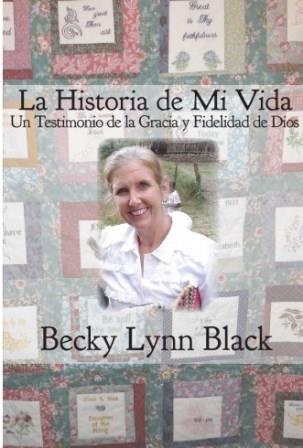
5:30 PM Last night I was thinking (as I suppose I am always thinking) about missions. I had just enjoyed a delicious dinner with Kevin and Pam Brown and three of their four children at Appleby's in Wilkesboro and was "digesting" our conversation. (Whenever Kevin and I get together, it's like iron sharpening iron, with a blowtorch.) As I lay in bed I knew there were certain mysteries that one never comes to grips with in life, and one of them is grace. I kept asking myself, "Why would Kevin want me to share yet again with his congregation? Why have I found such favor in his eyes and in the eyes of his people at Mount Pleasant?" I do not doubt that it is completely and purely a God thing. God brought Becky and Dave Black together with Kevin and Pam Brown many years ago. I came to "preach a revival" and the rest, as they say, became history. So as I lay in bed last night, I gave silent thanks to God for the Browns and their fabulous children, and for the congregation known as Mount Pleasant Baptist Church.
Today I did the obvious things. I taught. I talked with people. I prayed with individuals. I presented a very specific need. But you folks did the really hard work of prayer. Prayer is a first thing for the Christian. It isn't something we tag on to the "real work." It is the real work. Our Father always has our ultimate good in mind. We don't have to beg Him for finances. We are to trust Him for it all. And so, now that I am back on the farm again, I am resting in His sovereignty and grace, knowing that He is able -- more than able-- to complete the work that He has begun in India. That building will be completed -- I'm sure of that. And it will be completed, not because of anything we have done, but because our God delights in giving good gifts to His children. Nothing is impossible for Him. We can trust Him with the unfathomables. Well did Spurgeon say that a mouse might worry if there is enough corn in the barns or a fish worry about enough water in the oceans before a Christian need be anxious over the sufficiency of God's grace.
How much was given toward the India school today? I don't know and, in a sense, I don't care. It's enough that He knows. The simplicity of God's promise is my hope and strength: "My grace...." My Daddy has no favorites. Just as He has amply provided for His people in America, so He will amply provide for His saints in the Asian subcontinent. Where we live makes no difference to Him. His love is universal, and He cares for His own. Praise His name forever!
Kevin and his family:
Kevin and Pam were on tiptoes all weekend long, expecting "the" phone call telling them they were about to become grandparents for the first time. The call came between services. Little Charlotte is on her way!
"You wear the Victor's crown."
"You overcome, You overcome!"
Saturday, November 22
8:15 AM Greek student:
Thou are without excuse!
How easy do we need to make it for you to study Greek and then to retain the Greek you've learned? First off, you can get your Daily Dose of Greek. (Try it. You'll like it.) And now there's your Daily Cup of Greek. (I kid you not.)

Folks, it takes more than good intentions and ability to make the U.S. Olympic Team. Plenty of wannabes have both but never make the cut. The same is true in your study of the New Testament. I've been saying it for years: Learn Greek! Anyone can do it. Pastors must do it! Did you know there are churches out there who have elders who couldn't translate a single verse of Greek if their life depended on it? I say to them: Get with the program, friend. When you became an elder, you in effect said "yes" to super-serious Bible study. It's sort of like saying "I do" to your wife when you get married. No, I don't expect you to know everything about Greek. I sure don't know everything about Greek! But if people come to you with a question about, say, divorce and remarriage, you had better be able to exegete Matthew 5 and 19 and base it on your own exegesis of the text and not on someone else's opinion.
"How then should I study Greek? I'm a busy pastor?" How about my DVDs for starters? Or just go online. There are a bazillion people teaching Greek these days.
So ...
Greek student: Thou are without excuse!
Pastor: Thou are without excuse! And greater is thy judgment (James 3:1).
Friday, November 21
4:06 PM Care to think about the church with me for a minute? My local church, like yours (probably), is constantly thinking about its ecclesiology. The main question -- in my view, at least -- is the degree to which our churches should be willing to adopt normative biblical principles and concepts that constitute the structure and life of the church. Questions include:
-
The level of involvement of the whole people of God in the life and witness of the church.
-
How leaders are to be chosen.
-
How "ordination" is understood and practiced.
-
The role of the "preacher" in the assembling of the church.
To people (like me) who deny a sacramental and sacerdotal priesthood, these questions are anything but theoretical. So here I offer a few random reflections. Feel free to respond on your blog.
1) The study of church history is absolutely vital if we are to return to biblical norms. For example, it was the Protestant Reformation that replaced the altar with the pulpit and the priest with the preacher. The New Testament, of course, sees the center of the gathering of the body as neither an altar nor a pulpit but a table. The apostolic church gathered explicitly to "break bread" (the telic infinitive; see Acts 20:7), not to listen passively to a sermon.
2) Moreover, the apostolic church was both a charismatic and Spirit-filled diakonia. Whatever organization there may have been in the early church, it existed in order to promote the proper and orderly interactions between the spiritual gifts (exercised freely). Ekklesia was a body of which Christ alone was the Head and in which each member was a fulltime minister-priest. After the third century, however, the charismatic ministry began to disappear and there arose in its place a hierarchical and institutional church. The stage was thus set for the spectatorism so evident in our churches today.
3) The New Testament believers did not have an abstract concept of the church but one that was dynamic and concrete. They saw it as their mission to manifest Christ to the world by becoming His representatives and by participating in His transforming of people's lives. Energized by His Spirit, there were aflame for Him, and when they gathered, the members worked "together as a whole with all the members in sympathetic relationship with one another" (1 Cor. 12:25).
4) The church of the New Testament was nothing less than a partnership of grace in which every member had its function to fulfill, without jealousy or competition. Their gatherings were Christ-approved, Christ-centered, Christ-oriented, Christ-like, Christ-infused, Christ-exalting, and Christ-led. Remove Christ from the church and you might as well build a house on the sand (Matt. 7:24-27).
5) The Pastoral Epistles in particular need to be reevaluated. Neither Timothy nor Titus were pastors. They functioned as missionary-apostles and represented the church at large. Centuries later, the Anabaptists and other "radical" groups argued that the primitivism of the early church was normative in every age. The priesthood of believers was to be more than a dogma. They actually addressed each other as brothers and sisters. (Oh, how I wish we could do that today in our churches!). They insisted that Christ's obedience to the Father should be exemplified in the life of every regenerate church member (Nachfolge-Christi).
6) Finally, ecclesiastical superstars didn't exist. Pastors (i.e., shepherds) were also sheep. In fact, that was their primary identification. (Can you imagine if pastors today had secular jobs like everyone else and lived out in the world, as in New Testament times?)
So ... where does my church, or yours, fit into all this? For starters, maybe we should reexamine our priorities when it comes to church finances. Any church building we construct must be purely functional in nature and should express a biblical understanding of the true nature of the church. Theologically, the church does not require a building. A church building has no more right to be called a "sanctuary" than a garage does. The body of Christ, the communion of believers, is the true tabernacle of God. Think and act this way today and you may well end up where the Anabaptists of the sixteenth century did -- maligned or even persecuted. The need today is not to mimic the Anabaptists. The need is to renew our commitment to the New Testament Scriptures. Think of the followers of Zwingli in sixteenth-century Zurich. It was their allegiance to the New Testament (in Greek, by the way) that got them in so much trouble with their erstwhile teacher.
So the question is, "Is this pattern scriptural?" If not, a return to the New Testament may be the healthiest antidote to institutionalism.
P.S. I feel led to make an additional statement as a footnote. I know of many people who would never think of asking the church to help them pay for their summer vacation at Disneyworld or in Europe. Then why do so many of us automatically turn to the church to help pay (or even pay for entirely) the costs of our mission trips? I urge you to put aside money to that end, to even schedule your mission trip before you schedule your yearly vacation. If there's any money left over, then you can enjoy Disneyworld or Paris. But please, plan ahead. Save if you can. Do not ask the church to do for you what you can (and perhaps ought to) do for yourself. Yes, it will take scrimping and saving. But the money is far better used in the Majority World than in paying for your airfare. I know not everyone can do this. But some can. Have you ever considered it?
3:18 PM I feel like it's been forever since I last updated you on India. Today I received a building update from Mammen Joseph in Bagdogra. Here's what he wrote:
The construction work of the building is going on .... We have completed the structure of the building and we are now bricking the building. We also have started the basic plumbing and electrical work of the building. I am attaching a few pictures and I hope this will help you to see the progress. We are praying and hoping that we would be able to finish the building by the end March and start the school in this building and also start the seminary classes in it.
Praise God! When I read those words I nearly lost it. Because I know that only God could have done this work. Right now I'm prepping to speak at Mount Pleasant (as you know) where I am asking God to open the hearts of His people in a big way. A few nights ago, the Lord put on my heart to ask Him for an offering of at least $6,000. How can we hope to make a difference in India unless we are sacrificial? I look at these pictures and I am undone with joy. If only Becky could see them! I've said it before -- I love missions! It's the most joyful, difficult, exciting, frustrating thing you could ever do with your life. But if you look closely, past the scars and problems, you can see the face of the Gospel. Oh, the people of India as seen through the eyes of God. Loved and lovely, precious beyond belief!
2:50 PM So the president used Scripture in his speech. So did George W. Bush. So did Ronald Reagan. In my opinion, citing Scripture during a political speech is akin to citing the "original Greek" during a sermon. Both are calculated to end all discussion. If "Scripture" says we should do something, who are we to argue? If "the Greek" says such-and-such, who am I to challenge what the preacher is saying? We cite Scripture and then rekindle the arms race. We quote the Bible and then polarize the globe in the name of democracy. We invoke the name of Jesus and then place the national interest above wider Christian ethics. Radical Christianity is not anticlerical in the sense of rejecting academic learning or theological precision, but it does insist that proof texting is a bad idea, whether it is for biblical purposes or for doctrinal reasons.
12:10 PM Sign the petition to free Asia Bibi. Time is running out.
9:50 AM My take on last night's speech? Two sentences. The job of the Congress is to make laws. The job of the Executive Branch is to enforce them, even when it disagrees with them.
That said, I am more concerned about the church than the state. By that I mean we are dealing today with people who think there must be a "Christian" solution to the problem of immigration. These people are quick to make judgments based on their views -- whether conservative or liberal, Republican or Democrat -- of how society "should" work. They cherish the hope that all can be resolved if only their "biblical" approach is adopted. These people forget that there can be no accord between the stoikeia of the world and the kingdom, between the values of society and those of revelation. As Christians, we are invited to take part in a dialectic with the world, but in my opinion it is a very grave mistake to climb on the bandwagon of parties or doctrines.
As for pastors and other church leaders, let them beware of the ever-present temptation in their pursuit of "relevance" to reduce the Gospel to social responsibility and political action. Such a reductionist approach invariably accelerates divisions within the church, and the reason is obvious: Christ had no political axe to grind. Never have there been so many Christian consults on world hunger, the problem of war, etc., but despite the significant increase in knowledge there is less and less active obedience. Jesus cares deeply about social injustice and poverty, about immigrants and their families, but His followers engage these issues in unique kingdom ways. What is uniquely kingdom about supporting amnesty on the one hand or deportation on the other? Following Jesus doesn't necessarily give us any insights into the means of "fixing" society through political avenues. The far more difficult task of imitating Jesus remains. What have I personally done to alleviate poverty or human suffering from my own pocketbook? When the Yazidis fled to Sinjar Mountain while being pursued by ISIS, did I give anything to help in their relief? (Yes I did.) When I heard that Nina Pham was infected with Ebola and was asking for financial aid, did I assist her? (Yes I did.) When a tornado swept through Person County, NC two years ago, did I get out my chain saw? (Yes I did. The Lord led me to do all these things.)
Now, I empathize with the president from a purely political point of view. Congress won't do its job, so I'll light a fire under their feet. But is it really the case that those who oppose the president's immigration policies are any less concerned about the plight of undocumented workers or less informed than he? Each party has its mantra: Republicans "don't care about the poor." Democrats "don't care about the law." Each demonizes the other. Why should the church get involved in any of this mess? It's a mistake to confuse Christianity with socialism or capitalism. Christian love is addressed to the "neighbor"; it is an interindividual matter. Sadly enough, Christians who try to find a political solution for poverty or immigration are either showing their contempt for these people or trying to fool them. Our protest against "injustice" rings hollow because we have failed on a personal level to love our neighbor. The Anabaptists of the sixteenth century knew all about the hypocrisy of church-state politics. They argued that the Christian's actions must be specifically Christian, that Christians must never identify themselves with this or that political or economic movement. Instead, Christians are to inject into social movements what Christ alone can provide. That view is worth considering again today.
So that's my take on last night's speech, and where I stand on "God's politics." I ask only this: Let's apply the two great commandments absolutely. Let's act on them without weakening their power by acting like the world. As Christians, we are called to weave into the fabric of our daily lives the revolutionary teachings of Jesus. I do not mean "revolutionary" in the sense that Jesus was a Zealot or an advocate of state power. (Oscar Cullmann disposed of this nonsense in his book Dieu et César many years ago). My point is simply this: When Christians preach the saving power of the state, they only contribute to the evil of our time. Let's not forget that what people really need is not a few more political advantages, but something that Christ alone offers. Christians will be Christians to the degree that they suffer with those who suffer, and if they seek out, along with those sufferers, the one and only way of salvation.
Thursday, November 20
5:10 PM "You need not cry very loud; he is nearer to us than we think." Brother Lawrence.
4:42 PM This Sunday, my message is titled "Do You Know Who I Am?" Anybody want to guess the answer?
Cliff notes:
1) All Christians are sent by Christ to infect all of society with the power of the Gospel not only by what they say but by what they are.
2) Multiply the workers. This is fast becoming a first priority with me. When I leave for Asia on Dec. 11, it will not be to teach. It will be to train the teachers. This is the basis of my favorite verse as a teacher -- Luke 6:40. God's basic strategy for churches of the New Covenant is the multiplication of workers. "It's better to put ten men to work than to do the work of ten men" (Dwight L. Moody). I want to spend my last years as an enabler and missions mobilizer.
3) Sunday sermons have their value, but what is taught on Sunday usually has little to no influence on what listeners do on Monday. The sermon is informational and does not, as a rule, enlist workers. I want to see that paradigm changed.
4) Evangelicals place way too much confidence in "preaching" and have consistently overrated its capacity to develop laborers for the harvest. The church is a recruiting station of people who will do the work of the ministry and not just talk about it.
5) I want to see the ministry of every believer recaptured. The strongest, most far-reaching witness of the church must be that of the so-called laity. Leaders and led alike must form a mission team. No amount of professionalization will have any lasting and radical effect on the church's mission if the individual follower of Christ fails to come to a biblical understanding of his or her calling in the body of Christ.
6) Church members must move from being an audience to a fellowship of disciples. The goal is faith that leads to action -- a whole life oriented to mission and ministry.
7) We will never reach the world for Christ if missions is for "missionaries" only. Pastors are essential, but above all they are enablers, equipping God's people for works of service whatever their location or vocation may be.
So ask yourself the question: Who am I? The simple fact is that we are all called to follow Jesus and not someone's political or economic or even denominational ideals. If we were to focus on Jesus Christ and stop making "church" our primary focus and instead focus on being transformed by the Gospel, saying "no" to political power, and choosing to follow the downward path of Jesus, I believe we would see the kingdom of God exponentially expanded in this world.
So ... "Do You Know Who I Am?" I am a follower of Jesus. I am a fulltime missionary of His, sent out to sacrifice for the poor and have a transforming effect on society that politics could never even begin to dream of.
2:06 PM Anne Graham Lotz on biblical leadership.
Lotz said one of the dangers was giving pastors an elevated status. "Maybe we've had our focus on the wrong thing. We've turned our pastors and leaders into celebrities. We've turned them into more than what they were ever intended to be." Referring to Peter's teaching in 1 Peter 2:25 and 5:2-4, she said: "They're to be shepherds, they're under-shepherds. Peter said, don't ever forget, shepherds, that you're also a sheep. And somehow we've gotten it backwards."
That's a sad, quiet truth.
1:50 PM "I thank Thee, O Lord, that Thou hast so set eternity within my heart that no earthly thing can ever satisfy me wholly." John Baillie.
9:52 AM Golden Gate Seminary (Brea campus) announces an opening in Educational Leadership.
9:02 AM Our final exam in Greek 3 will include translation and parsing from the book of Philippians. However, in lieu of the exam, students can choose to recite Phil. 2:1-11 to me in Greek. I've done this in other classes, like in the LXX class I taught a couple of years ago. Care to see a sample?
8:44 AM Check out this video of a couple of zany surfers in Buffalo, New York. Crazy as crazy can be. Takes one to know one, I guess.
Shaka, bruddah!
8:32 AM As we all know, of the nine fruits of the Spirit mentioned in Gal. 5:22-23, love is the list-topper. Love is the greatest commandment. It is the "Jesus Creed" (as Scot McKnight has put it). We are to have love for God, and love for others. But love is just one of nine characteristics of a true follower of Jesus. This morning I noticed -- for the first time -- that something was missing from this list. Or it seemed to me to be missing. Where is gratitude? Isn't thanksgiving a way in which Christians can be different? If you're filled with the Spirit, you'll also be filled with gratitude!
There is a reason I'm bringing this subject up with you this morning. Yesterday in my Greek 1 class I had a very transparent moment with my students. It was completely unplanned, unrehearsed. We had been going over the Greek words for prayer -- petition, adoration, request, thanksgiving -- when God hit me with a two-by-four.
Dave, have you ever given thanks for Becky's death?
I'm struck by how clear the Scriptures are when it comes to thanksgiving. We all know 1 Thess. 5:18: "In every circumstance give thanks." Our circumstances shouldn't matter one whit when it comes to thanksgiving. Par for the course. No gloomy bunch of pious prima donnas, we Christians! Even when we're sobbing like a baby, we can still thank God in the circumstance. But then we forget. We forget that just as 1 Thess. 5:18 is in the Bible, so is Eph. 5:20. Perhaps you've heard the slogan -- "Christians are to give thanks in everything but not for everything." Wrong. Wrong as wrong can be. "Giving thanks always for everything to God the Father in the name of the Lord Jesus Christ." There you have it, in black and white. Grit your teeth if you have to, force the words out if you must: "Thank you, Father, for this situation I find myself in."
Again, I'm struck by how hard it has been for me to say those words to my Father this past year. I'm ashamed at myself. It's not that I want to have an attitude of ingratitude. But I need to be honest with you, just as I was honest with my students yesterday. I'm not there yet.
This is the Thanksgiving season. I figure it's the perfect time to try and learn how to overcome this deficit in my life. This past year has been so intense, the pain so insufferable, that more and more I find this blog a useful tool. You see, I am writing more for me than I am writing for you. You have been with me through the hardest year of my life. And I've made tons of progress. But I'm not going to pretend with you. I'm not going to pretend I don't have a problem. I'm not going to pretend that I don't still have tons to learn about what it means to give thanks for everything. Eph. 5:20 is one of those verses that really gets under your skin. God is sovereign, and because He is sovereign He makes all things work for good in the life of the believer. I know that intellectually. I understand that theologically. But my intellect and my theology are flanked on both sides by grief and pain. I had to swallow hard just to share these words with you this morning. I have always thought of myself as a grateful person. I work hard at saying "thank you" to the people I work with, to my students, to my family. But the truth is that I'm scared. I have yet to set foot outside my closed and self-protective heart. I'm not sure I will ever be able to thank the Father for Becky's death. I feel like I'm missing something in the healing process, and I hate this feeling. But I'm not there yet, folks. I'm just not there.
That being the case, I will go about my duties this holiday season thinking a lot about thanksgiving. I so desperately want to be thankful for everything. I just wish it didn't seem so hard at times.
Wednesday, November 19
4:28 PM This and that ...
1) I love our library!
2) Doug Moo will speak live tonight on the subject of Bible translation.
3) Lots of great papers on Hebrews at this year's SBL/ETS meetings in San Diego.
4) Getting caught up with a doctoral student over lunch today.
5) Brian Fulthorp says that Greek students should move from being "form chasers" to "function chasers." That says it pretty well if you ask me.
6:32 AM My message this Sunday at Mount Pleasant will be a very simple one based on Matt. 28:19-20: We can no longer outsource missions and evangelism to the professionals. It's my turn to step up to the plate. But lest you think this is some kind of a burdensome duty ....
I often hear people complain that witnessing does not come “naturally” for them. With this I agree. Evangelism is not a natural task at all; it is a completely supernatural enterprise. In fact, personal evangelism is utterly impossible unless the Spirit of the Lord Jesus is given free rein in our lives. Thus, while it is our duty to share our faith with others through word and deed, even more it is a divinely-enabled privilege. And unless we learn to view evangelism in those terms – as a great privilege and not merely as a duty to be performed legalistically – we will never be successful in motivating either ourselves or others to share Jesus, no matter how much training we may have had in this or that evangelistic technique or method.
I agree completely with these sentiments, as well I should (the quote comes from Will You Join the Cause of Global Missions?).
So on your mark, get set ....!
Tuesday, November 18
5:52 PM Yep. I'm a bit sappy tonight.
5:44 PM Okay, I may be stepping on your toes here, but I know several people who are going to leave their dogs out in the cold tonight. Tomorrow it will be 17 degrees when I wake up at 5:00. Unless your dog has a very hairy coat or a very small and warm dog house, why don't you keep them in the house with your family tonight?
5:34 PM Studying Greek is a beastly struggle. I know. Been there, done that. But the rewards? Oh, the rewards! Learning Greek is one of the hardest things you'll ever do. But a huge payoff awaits those who persevere. The key? Keep on working at it. Don't give up. Redouble your efforts. Never quit.
Pix from today's classes:
1) Our student-led discussion of the nature of Philippians as a "letter." Excellent Ph.D. seminar!
2) Diagramming Gal. 1:1-5 in my Greek 3 class.
3) The apostle Paul took a standard epistolary formula and poured into it rich Christian meaning. In fact, you can outline the entire book of Galatians based on the structure of the opening paragraph. How cool is that.
Greek student: Keep at it. The line of progress is usually a zigzag, but this doesn't mean you can't make real progress. With the prize in mind, keep on pressing toward the goal!
5:34 AM The church does have a mission; it is missions. As fire exists by burning, so the church exists by doing what Jesus did with His body: He gave it away for a lost humanity. Do not let anybody fool you into thinking that the gathering exists for anything less than the going.
Monday, November 17
11:22 PM One more. This time from Egypt.
5:14 PM Here's the picture that comes to mind every time I feed the donkeys. Wasn't Becky the sweetest little thing you ever saw?

And here she is in 2004 when we visited Burji, the land of her youth.
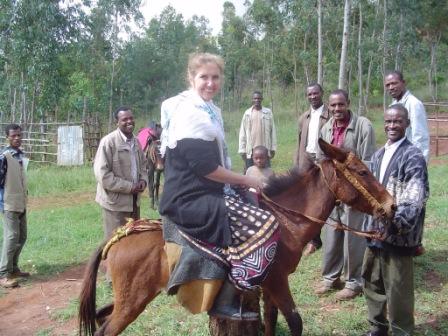
There goes Dave, reminiscing again.
Yep.
Who can forget a life so well lived?
4:23 PM What with the colder weather and all, I've been letting the dogs stay in the house for most of the day and all of the night. They enjoy being with me, and I enjoy their company. However, I've made it very clear to them where their boundaries lie, and that under no circumstances are they to enter my bedroom. Well, so much for rules. Today a huge storm comes up and who decides to settle down at the foot of my bed? Sheba, girl, yes I know you're deathly afraid of thunder, but this is daddy's room, right?
I'm such a softy. Next thing you know, Daydy will be hanging out in my room too.
10:30 AM I've always known that Henry Neufeld had some radical ideas. He keeps finding in the New Testament a much different model of church than is found in most denominations, his own included. That is not to say that Henry is anti-church. Hardly. I have spoken in his church in Pensacola, and I have seen up close and personal what his church means to him. Yet as much as he loves the church, and as much as he enjoys publishing books about the church (I assume he enjoys doing that!), nothing seems to rid him of his dis-ease (please notice the hyphen) with the erroneous expectations placed on parishioners by clergy and fellow laity alike. I call as witness his latest blog post titled Some Thoughts on Ecclesiology from Someone Utterly Unqualified. It is no exaggeration to say that Henry is, in my opinion, very qualified to write about ecclesiology. Powerful insights like the ones he shared with us today are not derived from theoretical observation. They are forged in the crucible of church life and must be worked out in the context of the local church. As one who has published a book on the church with Henry, I am pleased to see him opening up about his personal thinking and feelings about the church. The very concept of "clergy and laity," as Henry rightly points out, is completely absent from the pages of the New Testament. And that's what I like the most about Henry's writings. His goal is not simply the abolition of the clergy-laity system (as if that's where the real problem lies) or to see the weekly observance of the Lord's Supper in a meaningful and Christ-exalting way. His is no narrow anti-clericalism. I suggest that Henry is first and foremost a man of the Word, and because he is a man of the Word (which he reads in Hebrew and Greek) he is a man of the church. So my advice to you: Read what Henry says, and pray that God will open the windows of heaven to bring about a revolution of fidelity to His Word and then a revolution in our churches that will enable all of us, whether Baptist or Methodist, to become the whole people of God who "do the work of the ministry."
9:24 AM Just booked my flights to Memphis for the lectureship I will have the honor of giving at Mid-America seminary in April 2015. Can't wait to visit the Mississippi River Museum, Fort Pickering, and Davies Manor in my free time.

8:28 AM SEBTS will be well-represented at this year's annual ETS meeting in San Diego. Who wouldn't want to be in SoCal in November?
7:48 AM If you're interested in the letter to the Hebrews, you might be interested in the conclusion to my paper, "Notes on the Translation of Hebrews 6:1":
Based on the above discussion, I am prepared to make the bold assertion that in Heb. 6:1 the author of Hebrews uses a metaphor drawn from the world of sailing. It is a graphic word picture indeed. Not only are the readers exhorted to leave the basics of their faith behind; they are to “raise their sails” as it were and allow the Holy Spirit to carry them along to maturity in their Christian faith. The author is quite certain that this can be done because progress ultimately does not depend on human effort but on divine supply. In Hebrews, God is the one “for whom all things and through whom all things exist,” and so the author is able to write a mere two verses later (6:3), “And this we will do, if God permits.” Hebrews assumes that progress in the faith is not only required but enabled, as chapter 8 clearly shows (the New Covenant proves it). The shift from the old life to the new one in Christ has begun, but God’s promises have not yet been fully realized. Yet under the New Covenant, God himself intervenes to deal actively and decisively with sin through the death of his Son on the cross.
If we are correct that the author employs a nautical metaphor in 6:1, how might we translate the text, taking into consideration not only the lexeme phero but also the voice (passive) and aspect (imperfective)? Here is how I originally rendered the text in the International Standard Version New Testament:
Therefore, leaving behind the elementary teachings about Christ, let us continue to be carried along to maturity, not laying again a foundation of repentance from dead actions, faith toward God, instruction about baptisms, the laying on of hands, the resurrection of the dead, and eternal judgment. And this we will do, if God permits.
In conclusion, the paradox of the Christian life is that progress in the faith is no less enabled than it is required. It is through the New Covenant that Christians are “carried along” to maturity, as if they were being borne up by the Holy Spirit himself. The author of Hebrews recognizes God’s role in bringing sons to glory, for nothing can be accomplished in the ultimate sense unless God is in it. In short, the author’s statement in Heb 6:1-3 is designed to provoke a sluggish audience to greater commitment to make genuine progress – progress that presumably will occur, but only “if God wills.” True religion, then, is not a matter of self-effort. If one is truly yielded to the leading of the Holy Spirit of God, all the rest will follow as a matter of course.
7:43 AM Quote of the day:
There are about 4,200 Indian missionaries at present, making India the largest non-Western missionary-sending country in the world. Most of these missionaries are working within the borders of the land cross-culturally. India is not a mere country, it is a sub-continent with many small countries.
Read Evangelicalism in India. I am supporting evangelists in India. You can too. Why not stop this very minute and take a spiritual inventory of your life? Are you living for eternity or is your life centered around things? The missionaries in India are ready to reach their own. They know the culture, they speak the languages (there are 780 of them!). I don't recall where I saw it, but I once read that if one out of every 92 evangelicals in America sponsored just one missionary evangelist in India, a half million villages could easily be reached.
So how about it?
7:12 AM Rob Noftz reviews the New Testament Greek Portal:
Sunday, November 16
5:43 PM Just finished the first draft of my essay on Heb. 6:1. Good thing too. I've been staring cross-eyed at this screen for the last ten minutes.
4:20 PM I've written a brief postscript to Becky's autobiography in Spanish. It begins like this:
La primera cosa que noté sobre Becky en aquella cola en la cafetería hace 40 años fue su caminar — callado, agraciado, elegante. Cuando ella se paró en la cola en frente de mí, en ese mismo instante supe que ella era especial. Detrás de sus lentes brillaron unos hermosos ojos azules. Una oreja, yo noté, sobresalía más que la otra. Qué linda, pensé para mí mismo. Nos conocimos, y el resto fue, como dicen, historia.
For more information, go here.
1:58 PM Thousands of hidden people groups are without the Gospel in Asia. Will you join me in crying out for the invisible God to go before us in battle for their souls? I can't wait to share this message with our good friends at Mount Pleasant Baptist Church next Sunday!
1:25 PM At the fellowship today I was asked if I had written anything on Christian unity. You might check the following essays:
-
Paul and Christian Unity: A Formal Analysis of Philippians 2:1-4
-
The Pauline Love Command: Structure, Style, and Ethics in Romans 12:9-21
10:16 AM Oklahoma Baptist University announces an opening in Biblical and Theological Studies.
9:54 AM Quote of the day (Rod Decker):
There is wisdom in using several versions for Bible study, since no translation can express everything found in the original languages. We are blessed to have several reliable modern translations that help us understand the Word of God more clearly. If our mission is to clearly communicate the Word of God to a lost world and to God’s people, then we ought to think carefully about our choice of translations to accomplish that purpose.
9:46 AM Here's the intro to my new essay:
This essay invites the reader into the intriguing world of New Testament lexicography. The unique style and diction of the epistle to the Hebrews have been noted for generations, and here I should like to offer a brief study of one of the most interesting aspects of style and lexicography in this superb epistle, namely the translation of pherometha in Heb. 6:1. The emphasis that Hebrews places on persistent faith is notable. How then does the author use this particular lexical form to advance the argument of the letter? I well recall posing this question to myself as I was producing the base translation for the International Standard Version New Testament many years ago. The rendering we ended up with varied considerably from the standard versions already in use among English speakers in the Western World. How and why we derived our rendering is the focus of this study.
I'm arguing that the rendering "let us press on" is precisely the opposite of what the author of Hebrews meant.
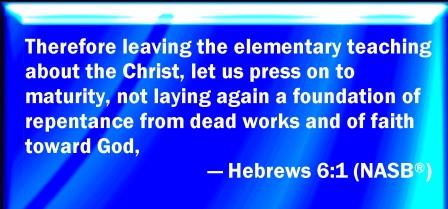
9:33 AM We become like Christ by being with Him -- not in a classroom. He is the perfect teacher.
8:20 AM Right now I'm typing another essay for publication. This one's on NT lexicography. Them writin' juices is flowin'.
8:03 AM A prayer for my children and grandchildren this morning:
Saturday, November 15
8:22 PM Amy Walker on American accents. Hilarious.
I love how she describes that awful thing known as "news-caster-lingo." Our local NPR station is the worst. Can you say, "We VARY our PITCH. A LOT." Want more fun? Try your German:
I once tried to teach myself Basel German. Even bought me a grammar and practiced speaking the dialect when I lived in Switzerland. I failed miserably. Just ask anyone in Basel. As Dave Barry once famously put it, "Americans who travel abroad for the first time are often shocked to discover that, despite all the progress that has been made in the last 30 years, many foreign people still speak in foreign languages."
Anyways ...
Uf Wiederluege!
7:30 PM The dogs are so funny. Every evening they insist on sharing an ice cream sandwich. Of course, I can't let them enjoy such a delicacy all by themselves.
12:44 PM It's cooooold out there today. But some things can't wait.
I needed to clean out the water trough. Now the donks are again enjoying cool, clear, fresh well water.
You know, I got these donkeys for Becky when she couldn't travel to Ethiopia any more. A little taste of home, if you will.
Which reminds me of all the good times we had in the land of her youth. I still love these people. Here's a clip you might enjoy of the children of Ethiopia. They are so precious!
10:18 AM I don't like surprises. Which is one reason I have dogs and donkeys. When people drive up to the house, I know they're there. When Christ comes, however, there will be no warning. He will come like an unannounced thief while we're sleeping, and then we will stand face-to-face with Jesus. The first thought on my sleepy mind this morning was: What if He came today? Am I maximizing everything I have for Him? I hope He returns soon. But am I ready? Am I making excuses for not being "all there" when it comes to the Gospel?
And then I stumbled across the most amazing news story on WRAL's website. Buried in the video archives is a story of faith and love that will make your hairs stand on end. The story asks, Why would an NFL star with the St. Louis Rams walk away from a multimillion contract and buy a farm in North Carolina? The answer? "When I think about a life of greatness, I think about a life of service." This former football star now gives the first fruits of his produce to charity. "Love is the most wonderful currency you can give anyone," he said. And you know what? I believe him.

Things haven't changed much in the 2,000 years since Jesus died and rose again. On our own, we're self-centered egotists. Only Jesus can rescue us from the merry-go-round of worldly success. All we have to do is accept His outstretched hand.
Watch the story and be blessed.
Friday, November 14
6:38 PM Goodness. Just discovered my iPhone has a flashlight. I am a sloooow learner.
6:30 PM Just want to give kudos to the ESA for their accomplishment. Imagine the difficulty of tracking a comet for a decade and then landing a spacecraft on a target moving at 135,000 kph.

I think the writers of the Bible knew a thing or two about tenacity. That's why they so often use words like "race" and "struggle" to describe the Christian life. Yes, we are promised faith that moves mountains. But faith also requires a shovel and a pick.
6:02 PM Are you a caregiver or do you know someone who is? Then you might be interested in this.
5:58 PM Just read "Forms of Address and Markers of Status" in the new book A Companion to the Ancient Greek Language. Ouch. The chapter was so good it hurt. I'm now working through "Jewish and Christian Greek."
5:30 PM My daughter and I thoroughly enjoyed today's NC Symphony concert in downtown Raleigh. So glad I have kids who enjoy classical music as much as I do.
Other than my daughter, I'm sure I was the youngest person in the concert hall, which was packed to the gills by the way (even though it started at 12:00 noon on a Friday). On the program today were Bach's Brandenburg Concerto, Britten's Serenade for Tenor, Horn, and Strings, and Ravel's Le Tombeau de Couperin. In a chiastic sort of way, the best piece was the centerpiece. When the French hornist finished playing the closing "Epilogue" back stage (and out of sight), the audience was left utterly breathless. It took us a full minute to recover and to begin applauding. I certainly don't consider every piece of classical music great, but this one was absolutely riveting and shocked the audience into awed silence.
I see that the NC Symphony will be performing Aaron Copland's Appalachian Spring next April, and I will definitely be there. Copland composed music that was uniquely American. He received the Pulitzer Prize for Appalachian Spring. I too am an award winner, in case you didn't know. Here's a snippet from my bio:
To date I have authored or edited some 25 Pullet Surprise winning books.

These include The Myth of Adolescence, Learn to Read New Testament Greek, Using New Testament Greek in Ministry, New Testament Textual Criticism, Interpreting the New Testament, Rethinking the Synoptic Problem, and Why Four Gospels? Amazon's got them listed in case you're interested.
Life is too short to take yourself too seriously.
8:28 AM A follow-up to my preceding post. I have a book called Biblical Scholarship and the Church: A Sixteenth-Century Crisis of Authority (Ashgate 2007). Chapter 2 is entitled, “Erasmus and the Return to the Original Languages of the Scripture” (pp. 27-52). If you can’t find the book and read the chapter for yourself, here’s a brief summary. The authors make these points (among others):
1) Erasmus’ motivation for publishing his Novum Instrumentum was to bring renaissance learning into the service of Christianity.
2) Erasmus’ revival of Jerome’s ad fontes appeal to exegesis (i.e., "Let’s go back to the original languages!") was viewed as a grave threat by the church and its official teachers. Erasmus sought to free the interpretation of Scripture from the “deadening grip” (the authors’ words, not mine) of scholastic philosophy.
3) In particular, Erasmus’ own translation of the Latin posed a threat to the Vulgate. Scholastic theologians regarded themselves as the only properly qualified interpreters of Scripture. If the uneducated laity could have unmediated access to the Scripture, this would endanger the church’s teaching and undermine its authority.
Now here’s what excited me the most about Erasmus. His entire life was wrapped up with the personal study of Scripture. For example, after leaving England he wrote to John Colet:
I am now eager, dear Colet, to approach sacred literature full sail, full gallop; I have an extreme distaste for anything that distracts me from it, or even delays me…. Hereafter I intend to address myself to the Scriptures and to spend the rest of my life upon them.
I can only pray that we – Baptists, Methodists, Mennonites, Pentecostals, Catholics, Orthodox – will arrive at the moment when we can only make sense of what God has said when we listen to Him ourselves.
8:20 AM I enjoyed reading Henry's response to the post I published yesterday. I especially loved this quote:
Because of the priesthood of all believers the failings of the church are my failings. I do not get to blame this on others. Jesus has called me. I do not have permission to blame it on the paid pastor.
Yep. We need to stop outsourcing blame. When we come to Christ, a brand new life begins. Having found Christ, we desire above everything else to get to know Him more and more. This is the very essence of the Christian life. As Paul says, “My goal is to know Him” (Phil. 3:10). What I want to ask Christians who have no desire to read the Bible is this: Do you really know the Lord? Love for Christ is a mark of being a Christian. Bible study is therefore very much a mark of discipleship, for how can we love a person and not want to know who that person is? The apostle John makes it clear that when we come to know Jesus Christ personally, we begin a life of friendship with Him – a personal rather than mediated relationship that is meant to grow richer and richer until the day we meet Him “face to face” (1 John 3:1). John is emphasizing the sufficiency of the Holy Spirit when it comes to knowing spiritual truth. It is He who grants us understanding of the Scripture. It is He who allows us to grow in knowledge and in spiritual stature. It is He who illuminates to our hearts and minds not only the person of Christ but His will for our lives. The Spirit is thus the supreme interpreter of God’s word.
Once we understand this, Bible study will become an important part of our life, a discipline that we can hardly afford to neglect. This means that once we come to faith in Christ, we need never be dependent on human teachers to lead us, helpful though they may be. As our “anointing,” the Holy Spirit not only teaches us the truth of God but guides us as we seek to live out that truth in our lives.
So Henry is correct (again). If you are not growing in your Christian walk, do not blame your pastor. Because of the New Covenant (Heb. 8, which, of course, is simply Jer. 31), you can know the Lord personally, and you have no need that any human should teach you. We have in the Spirit a teacher who is resident within us to show us the mind of the Lord. Little wonder that increasing numbers of Christians today are finding that they have a new love for the Bible.
8:08 AM A radical lifestyle should not seem radical at all. It should be the normal Christian life.
7:44 AM Please read I Can't Do This Anymore then pray for my colleague and friend Steve McKinion, whose son is in a major battle against cancer.
Thursday, November 13
9:04 PM Quote of the day #2 (Arthur Sido):
The disconnect between "clergy" and "laity" is nowhere more clear than it is in the subject of work. That disconnect needs to be destroyed, torn down and burned to ashes, and a good place to start is to have those who claim to lead the church stop sitting around pondering and start getting out and working.
8:46 PM Just spent the day with one of my daughters. We went out to eat then watched Interstellar. Doesn't even come close to Gravity. Just a good old fashioned sci-fi flick reminiscent of 2001: A Space Odyssey. I did, however, enjoy the acting of Matthew McConaughey, Anne Hathaway, and Matt Damon. Even William Devane and Michael Caine appear (to appease the older crowd no doubt). I can't think of a single significant message this movie was trying to send. Besides, it was way too long.
On the drive home I listened to Terry Gross interview Jon Stewart about his new movie (being released tomorrow) called Rosewater. It's about a journalist who is detained in Iran after covering the 2009 elections there. Sounds like a fascinating story. If you like the movie, let me know. In the meantime, this book came in today's mail so I face a very difficult decision.
Do I begin reading it tonight or do I finished watching Gettysburg? Decisions, decisions, decisions! Oh well. Tomorrow I get to take another daughter to brunch and then to hear Bach at the North Carolina Symphony. I am a blessed man!
10:35 AM Read Darkness. Powerful.
10:32 AM If you are a Patheos blogger and are sending me links to your latest posts, please know that they will go into my Junk Email folder. I never asked you to send me emails, and I certainly wouldn't send an email to your inbox unless invited to do so.
10:28 AM Henry Neufeld has just posted two essays about the book of Hebrews and its instruction about the Old Testament (Hebrew Scriptures). Someday I would love to have a public dialogue with Henry on this subject. Any way, I have for many years been a big fan of Henry's and I deeply respect him as a churchman, language scholar, and publisher. I think by reading his essays I better understand where he stands. He cares deeply about the Old Covenant (as I do) and is absolutely correct in saying that we Christians must never denigrate the Hebrew Scriptures in any way, shape, or form. So where do we disagree?
Well, I tend to see more discontinuity between the Testaments than Henry does. My theology, if you will, is more along Anabaptist lines than Reformed on this subject. The Reformers were unwilling to make a radical break with the past. Their churches remained established and the parish system was maintained. By contrast, the Anabaptists understood the example of early Christianity and the teachings of the New Testament to be the binding norm for Christians of all ages. For example, the Anabaptists argued that since infant baptism could not be found in the New Testament, it could not be used in a movement trying to emulate the life of the early church. To them the rite was non-apostolic and therefore an insidious shame to genuine Christianity. However – and this is a vital point – the real issue in baptism was not simply a return to the New Testament pattern. Rather, it involved a promise to walk in newness of life, that is, to live according to the Word of God by refusing to let sin reign in the mortal body. In other words, the local church, entry into which was through baptism, was to be a community of saints. The Anabaptists argued that without such concern for morality and genuine repentance, a slipshod practice of spiritual laxity would inevitably result. For the Anabaptists, only the New Testament contained the explicit teaching of Christ and His apostles. The Old Testament was not rejected, of course. It was simply subjected to the doctrines found in the Gospels and the Epistles. According to Pilgram Marpeck, the Old Testament must be distinguished from the New Testament as the foundation must be distinguished from the house. John Kiwiet summarizes Marpeck’s hermeneutics as follows (I give both the original German along with my own English translation):
Der alte Bund war eine Zeit des Suchens und des Dürstens und erst der Neue Bund eine Zeit des Findens und Stillens. Die Verheissung an die Alten geht im Neuen Bund in Erfülling [sic]. Die Finsternis wird zu Licht und der Tod zu Leben. Es ist wie der Unterschied zwischen gestern und heute; das Alte ist vorbeigegangen, und das Neue ist gekommon.
The Old Covenant was a time of seeking and thirsting and only the New Covenant a time of finding and stillness. The promise to the ancients finds its fulfillment in the New Covenant. Darkness turns to light and death to life. It is like the difference between yesterday and today; the old has gone away, and the new has arrived.
Marpeck’s point is that revelation was progressive and partial before Christ. He felt that the Reformers had mistaken the foundation of the house for the house itself. Marpeck’s two-covenant theology was based on Paul’s letter to the Galatians and the Epistle to the Hebrews, which taught that the highest court of appeal for all teaching concerning the church was the New Covenant. In short, he argued that the Scriptures must be interpreted Christologically.
Of course, I am not arguing that Henry fails to interpret the Bible Christologically. But I know some who do. This is one reason the Anabaptists looked with disfavor on professional pastors whose support came through tithes in the parish system. (Note: Henry has published a book by David Croteau that challenges the notion of tithing called Tithing After the Cross.) Unlike Old Testament Israel, their leaders were laymen, since Christ’s offering as High Priest was deemed to be exclusive. Their pastors, moreover, were chosen by the entire congregation according to the pattern established in the New Testament (Acts 14:23; 20:17, 28). They were supported by voluntary offerings (though many indeed supported themselves). As for the place of meeting, lavish sanctuaries were no longer necessary since Christ had abolished the Old Testament priesthood. John Darby, one of the founders of the Brethren church, encouraged the construction of simple chapels or assemblies with architecture that emphasized the priesthood of all believers. Pulpits and platforms were avoided. A typical chapel was a square room with a table and chairs for the speakers. Darby insisted on sitting among the members during the service and standing among them when he spoke rather than from behind the table. (Henry will recall that I requested to do the same when I spoke at his Methodist church in Pensacola several years ago.) The Anabaptists denied the significance of church buildings since physical structures were irrelevant to God. The buildings themselves were emblems of mere formalism. Large stone structures could never replace the true church of Christ that is comprised of two or three living stones gathered in His Spirit. They felt that with the addition of large numbers of extravagant temples the church had compromised with worldly standards of success. The Anabaptists energetically condemned this “externalization” of the Body of Christ.
Finally – and here is where I’m quite positive Henry and I would agree (based on the books he has published, many of whom are authored by “nobodies” in the world’s eyes, like my wife) – in Anabaptism appeal was made to the plain man’s judgment, unspoiled by the university. Those who toiled with their hands (craftsmen) or who worked in the soil (peasants) were presumed to be more receptive and teachable than those who had been corrupted by the folly of worldly wisdom. Here a certain irony arises, of course, for among the radical thinkers of Anabaptism there were not a few university trained men whose knowledge of the Scriptures and of the original languages of the Bible were unsurpassed. I think of my fellow Basler Conrad Grebel, who studied at the Grossmünster in Zürich for six years before becoming one of the 81 students to register at the University of Basel in the winter semester of 1514. At Basel he lived in the bursa (college) that was under the direction of the city’s leading humanist scholar, Heinrich Loriti (Glarean). From Basel he traveled to Vienna to continue his studies, and from there to Paris. Perhaps the Anabaptists’ attitude toward scholarship was based to a degree upon their work ethic. Hard work was considered a virtue. The peasant who worked with his own hands in cooperation with God’s nature was thought to have keener insight than the scribe with his multitude of books. So the Anabaptists might argue: “How can those who know the Master miss His simple and straightforward words in Matthew 23 condemning the use of honorific titles?” To the Anabaptists, use of such titles seemed the very culmination of worldliness and power. Their message was simple: Let the Reformers cling to the old ideas of Christendom. We will seek a thoroughgoing restitution of the church as it had been before the rise of Constantine.
Again, I'm not sure that Henry and I are very far apart on this subject. Indeed, we share very similar visions of the kingdom of God. Where we might differ is in our ecclesiology. The sixteenth century Anabaptists challenged the Catholic, Lutheran, and Reformed establishments of their day. (Sorry, Henry, but the Methodists weren't around quite yet.) Centuries later Barth and Brunner would question the church-state system from within. Why, then, should it surprise us today when Christians engage in responsible criticism of their own denominations? The goal of the Anabaptists, as has often been said, was to cut the tree back to the root and thus free the church of the suffocating growth of ecclesiastical tradition. That this goal is being revived in our day should be the cause of great rejoicing.
9:48 AM Just watched the donkeys chasing some crows that had invaded their pasture. Tolo Tolo almost kicked one. You birds don't be messin' with Becky's donks, ya heah?
7:55 AM A Christmas Carol returns to Ford's Theater in DC this month, and I'll be going with one of my children. It'll be my first visit to this historic setting.

7:48 AM You've heard of PTSD. But how about "moral injury"?
"I think that almost everyone who returns from war has suffered some kind of moral injury," Wood tells Fresh Air's Terry Gross. "And I do not mean by that that they have done something wrong — only that they have seen or experienced things, which violate their own sense of who they are, their own sense of right and wrong, their own sort of moral compass."
You can listen to the entire report at NPR.
7:38 AM Quote of the day:
I have the entire book of Hebrews recorded on my phone in Greek so I can listen to it in my car.
Now that's what I'd call commitment!
7:20 AM Thomas Hudgins has just published a YouTube featuring our new book Aprenda a Leer el Griego del Nuevo Testamento.
Thomas is an inspiring young New Testament professor with a broad range of interests. His impact is partly measured by his desire to educate a generation of Spanish-speaking pastors and indeed all believers who speak Spanish as their mother tongue. A gifted writer himself, he nevertheless took time to translate my beginning grammar into the Spanish language, along with the help of his wife Lesly and their good friend Fiorella Polo. There truly is something very humbling about all of this for me. The Greek New Testament depicts, in living color as it were, the life and teaching of the Lord Jesus Christ. That's why I feel there's something momentous in this Spanish edition -- and why I feel so undeserving of this blessing. It is impossible to express my gratitude to Thomas, Lesly, and Fiorella. God's great plan is to establish His worldwide kingdom, and this kingdom that God is building has a very peculiar character. It we wish to fathom its superb beauty and plum its rich depths at least to some degree, we must point others to the New Testament Scriptures. It is my hope and prayer that this Spanish edition of Learn to Read New Testament Greek will be useful and enlightening to that end.
Wednesday, November 12
6:14 PM As you know, I loved the theatrical production called Gravity. The movie is about real life, about loss, about just how hard it is to cope with the death of a loved one, and that's how the movie hooks us. In this clip (at 2:28) Ryan whispers, "I had a daughter."
Matt shuts off his music. "She was four. She was at school playing tag, slipped, hit her head, and that was it." Forget the flinch-inducing action scenes -- the words "I had a daughter" were enough to set me off. When it seems that life has hit a major speed bump, when it seems like things can't get any worse, they do. It's an intense movie for anyone who refuses to fake bravado in the face of human loss.
As if life wasn't gnarly enough for me right now, I saw a certain new book on prominent display in our seminary's library last night.
It sent me tumbling, hurtling, clinging to others for dear life. I felt like Dr. Ryan Stone, floating in darkness, cut off from Earth, never knowing when the next wave of debris will hit. I had to take a picture, of course; photography is one of the ways I cope with Becky's death. I chatted with the clerks and checked out my books, then went to my dorm room and balled like a newborn. Then I watched Gravity and saw it all clearly again -- a woman whose life is dramatically changed through loss, who copes with her devastating loss by isolating herself from other people, yet who decides to confront her loss head on (does she even have a choice?) and renews her commitment not just to exist but to live again. Odd, isn't it, that instead of grabbing my Bible, last night I decided to watch a film about outer space, about overcoming an inner crisis. This is the power of cinema. It does not replace the Word. But make no mistake: when you are struggling with loss like I am, when you see Becky's face suddenly staring at you from a public bookshelf, you are reminded not only of her mortality but of your own, and of the fact that life is worth living even if you live all by yourself. I'm learning how to cherish life again, even in the midst of this dizzying endurance test I'm facing. In the movie, "safety" is defined as gravity. For the believer, safety is grounded in something much bigger and more powerful than even gravity. I know this "something," or rather this "Someone,"and so do you, my friend, and He will see to it that one day we will finally reach Home.
Yes, it's hard to watch someone you love die. It's just as hard watching yourself go spinning off into space. Life is hard, period. It's also exhilarating. And, thank God, we don't have to go through it alone.
5:22 PM Potpourri....
1) Our gorgeous campus.
2) Having lunch with a doctoral student. I guess plaid is the new "in."
3) Read this book last night at the library.
On p. 14 I found this amazing statement: "U.S. congregations spend close to $4 billion annually on overseas ministries, both long and short term, which represents about 5 percent of congregations' incoming donations." Only 5 percent! Folks, I think we can do better than that.
4) I ate out twice on the same day! Here I am with my good friend Mark (who is a D.Min. student at the seminary) at the Texas Roadhouse, the noisiest place on earth. We were planning our trip to Guyana next spring.
5) My Greek students working in small groups. They're prepping for their take home exam. Here's hoping a bunch of them get the 110 Award.
6) My colleague Edgar Aponte sent me this pic of his son studying Greek with guess who?
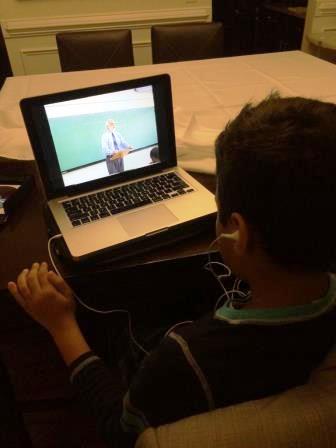
I've got one more picture to post (a very special one), but that's for later. Check out the blog tomorrow if you're interested in my thoughts about the new movie Interstellar.
Tuesday, November 11
5:48 AM The benchmark of our love for God is our burden -- and action -- for the entire globe, not just our part of it.
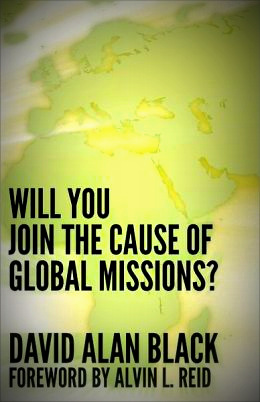
Monday, November 10
6:20 PM Quote of the day (Paul Helm):
It is one thing to express the view that poverty should be relieved and Christians joining with like-minded others to relieve it; it is another thing to say that the renunciation of Third World debt is the means to that end, that it is the will of the cosmic Christ, and therefore a Christian duty.
Read War and New Testament Ethics.
P.S. The discussion of torture at the end of the essay is well worth your time and is one reason I have decided not to see the movie Zero Dark Thirty. Another is this essay over at The New Yorker: Zero Conscience in "Zero Dark Thirty."
6:08 PM Just sent my Festschrift article to Spain. I remember the days when we used to do this by U.S. mail.
5:53 PM There is no call to missions. If you are an obedient follower of the Lord Jesus, you already are a fulltime missionary. Missionary conferences won't cut it. The work will remain undone until men and women with servants' hearts go out as volunteers and lose themselves in serving others.
Again, we are all missionaries. Let's act like it!
4:08 PM So sad but true.
Yet another reason to advocate body cameras on police. In the meantime, keep your iPhones handy.
12:52 PM Yeah, but I like teaching anyway.
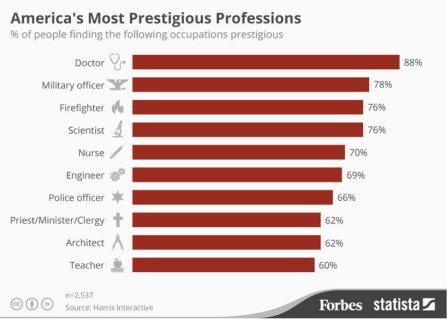
12:30 PM I am determined not to blog about recent headlines reporting Jesus being married with children. Argh! I just did!
9:16 AM I stare at this map every morning when I boot up my computer. What a message!
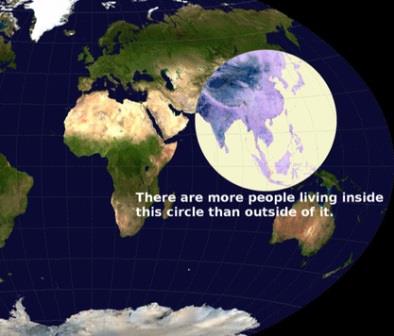
8:25 AM Special. That's what today is. You know, a day when something extraordinary happens to you, or when you do something crazy like spend an hour reading French poetry (even if you can't read French) or skip down the street backwards.
This morning I got a phone call from the pastor of the church where I spoke yesterday. He couldn't wait to share the news with me. You see, just between me and him, we had been asking the Lord for an offering of at least $4,000 for the India school project. That's an awful lot of money for any one church to give on any single Sunday, especially when I was one of three missionary speakers who taught yesterday. But God supplied.
Robert: "Hey, Dave, how ya doing this morning?"
Dave: "I'm doing great Robert. Hope you are."
Robert: "I'm fine. Listen, I'm off to a meeting but before I go I want to share with you some good news."
Dave: "Great!"
Robert: "Exactly $4,000 was given yesterday for the India school. God answered our prayers to the dime!"
Dave: "Praise the Lord!"
Robert (tongue in cheek): "Yeah, we should have prayed for $6,000!"
I have no tremendous or deep theological point to make from all this. This morning I thought to myself, "We are all equals before God, and someday we will stand as equals before Him. He will ask us to give an account of our lives. And then the only thing that will matter is how we measured up to His standards." I am as amazed as you are by the sheer grace of God, that He should allow us the privilege of working with Him in building His kingdom. You won't find this kind of excitement on TV or your computer or in the newspapers. I believe God is eager to do for any one of us what He did for Jabez (1 Chron. 4). Jabez asked God to give him bigger challenges and more opportunity, and I believe God did just that.
I'm not ready to settle down in my little ruts. I want God to give me bigger challenges, to expand my territory. Why should the fact that I'm a 62-year geezer stop me? "We have not because we ask not." Or, to steal another thought from Jesus' brother, "You wouldn't think of just asking God for it, would you?" (James 4:2, The Message).
So? What miracle do you need to ask the Father for today?
Sunday, November 9
5:22 PM General Daniel Bolger's new book comes out on Tuesday.
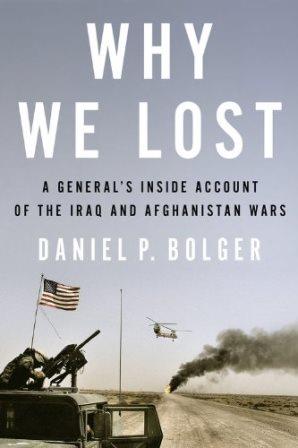
I just ordered it. The author's military awards include five Bronze Stars (one for valor). He was interviewed on NPR this evening. He concluded the interview by saying, in essence, "While we need to honor the men and women who served so bravely and selflessly in Iraq and Afghanistan, we also owe it to ourselves as a nation to understand where we, the generals, made mistakes so that we can learn from them as we plan for the future." I look forward to reading this book.
5:02 PM When I have to drive somewhere I often take the back roads instead of the Interstate. Today was no exception. My trip to Dinwiddie was on historic Highway 1. In fact, all of southern Virginia is historic. I must have seen perhaps as few as 6 other cars on my hour and a half drive. Everyone else was on I-85. I loved being at Smyrna. I basically told everyone I was done with churchianity and cultural Christianity. I so want to follow Jesus in word and not only in deed. I could almost hear the mighty rushing Wind filling the whole house. Many, including yours truly, were cut to the heart by God's Word. I spoke boldly, perhaps more boldly than I normally do. The Holy Spirit is like electricity -- conductive. Once He is released, we are no longer in control. I have to give brother Robert Rowland (elder) a lot of credit. He eagerly joined me in trying to upset the apple cart. How I thank God for pastors like that. Can you imagine what that does to your group dynamics? So a big shout out and thanks to the brethren at Smyrna and to the Lord for favoring us with His presence today. It made the drive all that more pleasant.
6:52 AM "Father, make of me a crisis man. Bring those I contact to decision. Let me not be a milepost on a single road; make me a fork, that men must turn one way or another facing Christ in me." Jim Elliot.
Off to speak. Please pray for decisions and fruit.
Saturday, November 8
8:10 PM Nice Chinese meal tonight with some friends Becky and I knew in Oxford. Happy Birthday, Chris!
Now it's time to let the doggies in the house and curl up with a good book.
4:18 PM As you know, a couple of months I spent a week in Gettysburg speaking at a conference (and rummaging about the battlefield). While there I had my "likeness" taken by one of Gettysburg's finest photographers.
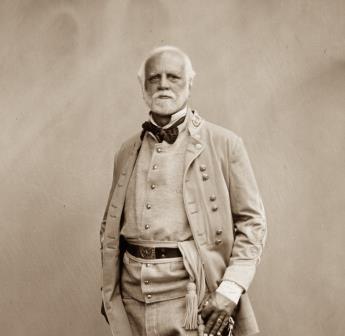
Every American knows what Robert E. Lee looks like, but hardly anybody today could recognize the face of George Meade, who defeated Lee at Gettysburg. Meade has been called the Rodney Dangerfield of the Civil War. He got no respect, at least not as much as Grant (think $50 dollar bill) and, say, Joshua Chamberlain. To add insult to injury, Abraham Lincoln sent Meade a note after the battle chiding him for not completely destroying the Army of Northern Virginia. Poor guy. At the end of the war, Meade complained to his wife, "I suppose after awhile [sic] it will be discovered that I was not at Gettysburg at all."
Just what is it about our need for recognition that drives us to complain when people ignore us or our contributions? The older I get, the more I think about this. In a mere 20-30 years I will be retired from teaching and (probably) long forgotten by the next generation of students. Life is just that ephemeral. How, then, should I live today? A few random reflections:
1) I must realize that my significance can't be measured solely by the number of books I've written or the number of years I've taught. My existence depends on far more than recognition.
2) I need to learn how to accept recognition with a simple "thank you," then move on.
3) I must accept that the need for recognition is a basic human longing. We all want to make a positive impact on this world. But our impact drive can easily become a bottomless pit if we are not careful.
4) I want to learn how to talk more about others than I talk about myself. My blog would be a good place to start!
5) Finally, I want to work more intentionally in teams in the final years of my career. Christianity is more than individual salvation. It is also membership in a body politic, a community that accomplishes its greatest work when every part of the body is functioning together.
Ronald Reagan once said, "There is no limit to the amount of good you can do if you don't care who gets the credit." God has rewards for all of us who serve Him faithfully. They drive our ambitions, as they should. But sometimes I wonder if the biggest reward of all is reserved for those who have been team players.
4:02 PM From time to time I need to visit my safe deposit box and when I do I sometimes take a look at my piece of the rock. The "rock," of course, is the Berlin Wall, which came a-tumblin' down 25 years ago this weekend. You can get the story here at the BBC. I remember visiting "West" Germany in the 1970s and thinking to myself, The two nations will never be reunited. Of course, I was wrong. What other impossibilities are out there, just waiting for the God of the Universe to pull another big surprise on us? North and South Korea being reunited? Iran opening up to the West? Nineveh becoming a tourist attraction for Westerners? Never say "never."
When we look at our lives we may think, "That will never happen. It would take a miracle if it did." There's always insecurity, doubt, lack of trust. Yet who knows -- maybe just around the corner is a bright new world full of new faces, new challenges, new adventures. Be assured that God has all of this already figured out. "I know the plans that I have for you -- plans for good and not for disaster, to give you a future and a hope."
Friend, you may be poised at the threshold of a whole new world.
12:22 PM Read 12 Things I Learned in My First 12 Months of Marriage.
I might add: Be sure to pray together every night without fail before going to bed. You and your spouse will never be closer than when the two of you are communing with God.
12:13 PM They're coming home!
7:58 AM Odds and sods ...
1) I took this quiz last night: "How good is your grammar?" I missed one. You will possibly miss it too, because the question is incorrectly worded (see the comments section). Anyhoo, have a stab at it.
2) Tomorrow I am speaking twice again, this time at a church near Dinwiddie, VA. My topic is the new revolution in global missions. Today it takes around $60 a month to fully support a national missionary and send him to a completely unreached village that is waiting to hear the Good News. Through our prayers and support, we can help him and many others like him effectively communicate the Gospel and establish completely indigenized local churches. Even better, what if the work of the Lord in places like India could become fully self-supporting through operating a school? This is what we are hoping to see happen in the northeast corner of India on the border of Sikkim and Nepal. Each of us has the opportunity to link our lives with brothers and sisters in places like this. Please pray that the Spirit falls upon our meeting and that I get out of the way so that the Lord may do His work.
3) This is my computer screen this morning. Finishing up my essay for the FS. What fun!
4) The doctor has given me permission to fly again, so it's back to Asia on Dec. 11, God willing. I am so grateful to the Lord.
5) Are you a Car Talk lover? Today at 10:00 NPR will host a special remembrance of Click. I can't wait.
Friday, November 7
5:58 PM Can you believe it? Navy SEALs are now publicly clashing over who killed bin Laden, leading a top SEAL commander to send this letter to his troops a week ago:
“We do not abide willful or selfish disregard for our core values in return for public notoriety and financial gain, which only diminishes otherwise honorable service, courage and sacrifice."
“All members exposed to classified information have a duty obligation to protect this information, regardless of what may be reflected in the media, accurately or otherwise."
It's human nature to want the credit for a famous deed. But arguing over who was finally responsible for that act makes the men involved look more like Barbies than like Supermen. It's a reminder to me that pride is a fatal sin, and we err when we treat it like a head cold instead of a cancer.
4:35 PM With the total number of American troops in Iraq about to double, President Obama might benefit from some advice from his predecessor, President George W. Bush.
4:08 PM Just got this email:
Energion Publications is excited to announce the upcoming release of two books in Spanish!
Read more here. I'm excited too. One of the books was written by my wife!
3:54 PM Is a picture really worth a thousand words? Yep. Basel, please cover up your man holes!

10:48 AM Randolph-Macon College announces a position in Bible.
10:32 AM Happy birthday, Billy Graham.
10:20 AM Just back from checking the fence lines with the dogs. My, what a gorgeous day the Lord has given us today.
8:54 AM It happened a mere 30 minutes ago. I was going about my business with NPR playing in the background when I heard these words:
"I mean, what are you going to tell your wife who's dying? That you love her, and you don't want her to die. But I knew she was dead a long time before the doctors stopped working on her," he told StoryCorps in 2011. "You hold someone's hand, and then it feels different."
The speaker? Retired Army Sgt. Max Voeltz, whose wife was killed in Iraq while disarming an IED. As if that were not bad enough:
"I am an Army widower. I don't think there's very many of us. And when I receive a condolence letter from a high-ranking government official that says, 'Mrs. Voelz, we're sorry for the loss of your husband,' it just makes it seem like nobody knows we exist."
Our culture doesn't like to acknowledge loss or grief. In fact, maybe right now you're thinking, "There goes Dave again, talking about the loss of Becky." Please forgive me for bringing it up again. But neither Max nor I can remain silent. That would be to dishonor the dead. The loss is always with us. We can either fight against it or embrace it.
To Max:
I'm glad, Sir, that you are doing better. I'm so glad you shared your story with us on StoryCorps. Maybe it helped you progress through your journey with greater hope. I know one thing: Your words brought buckets of tears to my eyes. But I'm fine with that. If you're interested, I blog a lot about grief at my website. Everyone needs to understand the process and normalcy of grief. You feel like the bottom has fallen out of your world. It's not a very comfortable place to be in life. So thank you for your honesty. It did me a world of good. I see I'm not the only widower who is still raw and fragile.
To Sgt. Mary:
The world is full of faces. Yours has been scarred from the IED that exploded in your hands in Iraq. Yet you took the time to reach out and help a fellow warrior. When I'm struggling with my wife's loss, I mean really struggling, I'll call a friend or one of my daughters. I don't need to face this struggle alone. As you live with the face of loss as your constant companion, I hope you will continue to reach out to your fellow sufferers. They need you.
Okay. It's back to work for me. If you want to listen to the conversation over at StoryCorps, go here: Bomb Techs Work Through 'Dark Spots' To Brighter Lives. But I'm warning you: You might want to have some Kleenex handy.
8:14 AM Notes from the back of the envelope:
1) Thomas Hudgins wrote to tell me I had finally made THE list. I really don't mind it since the word radical can mean getting to the root of things. Most of my heroes in church history were ordinary radicals like Hubmaier and Huss. They presented to the world another face of Christianity -- the way of the kingdom, the way of the cross. I just wish I lived this way better than I do. Oh well. There's always hope.
2) Supper last night was Korean bulgogi. Yummy.
3) Speaking of radicals, I think Allan Bloom would have qualified. Over at First Things, there's an excellent review of Bloom's The Closing of the American Mind. I ask prospective doctoral students to read this seminal work in which Bloom challenges the erudition of the nations' leading universities. Liberalism is alive and well in the United States (liberalism being supposedly the willingness to engage truth with an open mind), but in reality the most close-minded places in the U.S. are our leading academic institutions. Things are not always as they appear, wrote Bloom. He was right.
4) As you can see, I've begun proofing our Spanish grammar. This will be a long and tedious task for all involved. Already I can see one thing that needs changing (the font size in the chapter title is inconsistent).
5) During Civil War reenactments I've met Lee, Jackson, Stuart, and (on the Union side) Grant, Sheridan, and Sherman. But for goodness' sake, if you're going to impersonate the president, you had better at least resemble the man!
Thursday, November 6
6:45 PM Just received the final page proofs for my beginning grammar in Spanish.
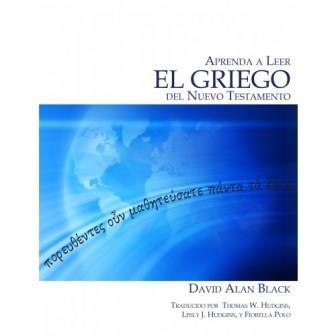
Guess what I'll be doing tomorrow? "God give me work till my life shall end, and life till my work is done" (Winifred Holtby).
But right now it's The Great Escape on DVD.
4:53 PM Quote of the day #2 (Carl Conrad):
The important question to consider, however, is where we draw the line between what is “basic” and what lies “beyond the basics.” A few years ago I thought that question had been finessed with the publication of Campbell’s Basics of Verbal Aspect in Biblical Greek. I objectied [sic] not so much to the book and its content as I did rather to calling “basic” what is an eclectic account of a subject still very much in dispute.
There are several pedagogical problems regarding teaching Biblical Greek. One obvious question is “What comes first?” The standard practice: first-declension nouns in η and present indicative active ω verbs. Wherever one starts, there are elements in the illustrative material that have to be glossed now and explained at some later time. A major problem is determining (a) what’s “basic” and what’s “beyond the basic” — what ought to be taught or learned in a “basic” course and what sequence of essential features of the language ought to be undertaken. There’s another question of pedagogical strategy regarding “regular” and “irregular” forms and usage: Do we just set forth and practice what’s “regular” and wait until it’s absolutely necessary to start discussing what’s deviant? We can’t avoid the contract verbs very long, much as we might wish to do so, but let’s put off as long as possible the μι verbs.... Should we talk about the optative mood in a first-year course? Which paradigms should be committed to memory, which should students be advised to consult an appendix for? More fundamentally, do we teach students what is “regular” and then, as need arises, drop lesser or greater “bombshells” of irregular forms and usage on them? For a struggling student, such repeated pedagogical “bombshells” can be like progressive stages of disillusionment to a sheltered child suddenly forced to “grow up.” For my part, I always tried to explain “regular” forms and usage as the “norms” in relation to which there were “deviants” to be encountered at a later time.
Does anyone think this question of what is "basic" has relevance for Decker's new grammar?
4:20 PM As you may know, my favorite New Testament book outside of the Gospels is probably the letter to the Hebrews. I have perhaps published more on that book than any other New Testament writing. Related to the above is the pleasure I derive when somebody else seems to be as enamored with this letter as I am. I think Henry Neufeld qualifies as belonging to this category of Hebrews-lovers. I see he's been revising his book on that epistle, and in the process has been treating the blogosphere with his thoughts and questions. In a post published earlier today, Henry brought up the question of the textual variant in Heb. 2:9. Does the author of Hebrews write that Christ's death was grounded in "the grace of God," or does he assert that Christ died "apart from God"? In Greek, the difference is slight: chariti theou versus choris theou. Writes Henry:
Which text is more difficult? It depends on how you read it. Using chariti seems almost superfluous to the conversation. Some of the explanations for chwris as a marginal gloss seem pretty reasonable. Either reading could cause someone to go for the other. Either can be explained as fitting the text.
At this point, I think the Nestle-Aland text has it right. The overwhelming external evidence would need to be countered by much stronger internal arguments to convince me that chwris was original.
However, F. F Bruce, in an essay entitled "Textual Problems in the Epistle to the Hebrews," defends the reading choris theou. He argues that "by the grace of God" was an early correction of "apart from God" and that it was first introduced as a marginal gloss. Thus, while Henry prefers the external evidence at this point, Bruce places a good deal more stock on the internal evidence ("prefer the more difficult reading"). I'm with Henry on this one. My approach to problems of variation within the text of the New Testament is based primarily on the external evidence, with the internal evidence serving to corroborate the conclusion derived from the external evidence. (See my New Testament Textual Criticism: A Concise Guide.) And yet Bruce's essay makes one pause. Origen insisted that the reading "apart from God" was common among the manuscripts available to him. Moreover, as Craig Koester notes in his Hebrews commentary, "Stylistically, 'apart from' would be consistent with the rest of Hebrews, since this word appears frequently in Hebrews and is regularly followed by an anarthrous noun, as in this variant " (p. 217). Yet I find it almost impossible to set aside the overwhelming external evidence in favor of "the grace of God."
The issue won't go away quietly, and Henry is to be commended for dealing it with honestly and carefully. It's fair to say that we both believe that textual criticism is part and parcel of the exegetical process, and that without it our efforts to interpret a passage in the New Testament will bounce off the ceiling.
So what do you think? Henry's post appears here. Bruce's essay was a chapter in a book I had the privilege of editing in honor of one of America's leading text critics: Scribes and Scripture: New Testament Essays in Honor of J. Harold Greenlee. I was pleased to present the book to Harold during a reception at the annual SBL meeting in 1992. A pdf. of Bruce's contribution may be found here.
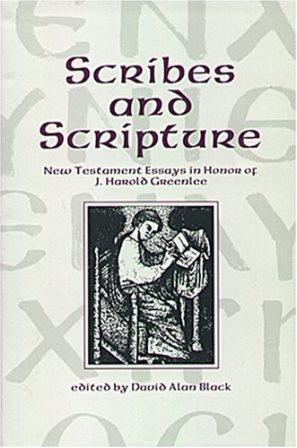
P.S. Forgive me, but I simply have to chuckle. After the book appeared, an up-and-coming New Testament textual scholar published a very favorable review of the Festschrift in the Catholic Biblical Quarterly. He wrote, "On the whole, the essays are refreshingly interesting and succinct.... Professor Greenlee has been well served."
The reviewer?
Bart Ehrman.
11:36 AM Today, in a White House ceremony, 1st Lt. Alonzo Cushing will receive the Medal of Honor for bravery at the Battle of Gettysburg 151 years ago.
Margaret E. Zerwekh, 94, of Delafield, has been an integral part of the campaign, writing to Wisconsin congressmen. She's conducted research, and lives in a house on property formerly owned by the Cushing family.
"He saved the Union and he needs to have recognition for it," Zerwekh said. "It is about time."
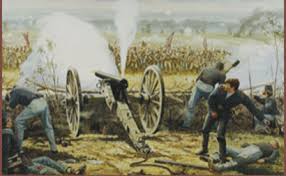
"He needs to have recognition for it." Reminds me of Paul's words in Phil. 2:29-30 in reference to Epaphroditus: "Welcome him joyfully in the Lord and make sure you honor such people highly, because he came close to death for the work of Christ by risking his life to complete what remained unfinished in your service to me."
Today I want to honor the memory of James, the 24-year old Burji who volunteered for the dangerous assignment of translating for me when I trekked among the Gujis.
After I returned to America he was found dead in his room, a victim of suffocation. He was the first martyr of our work in Ethiopia but not the last. The Bible is clear about one thing. If you serve the Lord Jesus wholeheartedly, you might just die for it. In other words, the choices we make on earth have important consequences. Jesus Christ knew He had to visit our planet in order for us to experience life both now and in heaven. James also knew that he had only one life to live, and to give. Jesus' love for others caused some to reject Him and eventually kill Him. The same thing happened to James. If you choose to follow the Lord (and make no mistake about it, it's your choice), He will duplicate His life in you, will give love a face through you, will be a light to your own corner of the world wherever you live.
Friend, give Christ today what little you have. He will take it and multiply it a thousandfold.
10:48 AM Just heard a report about Desi Arnaz's tribute to Lucille Ball just before he died from lung cancer. He said, "I love Lucy." "It was never just a title," he added. Though it breaks my heart to say it: "I love Becky." Though she is gone forever: "I love Becky." Though I say it with tears: "I love Becky."
Honey, I wish you were here to enjoy the fall weather with me, to help me care for the kids and grandchildren, to celebrate life together. I need you to hold me, to hear my heart breaking, to tell me everything's gonna be okay. Your leaving has left a giant hole in my life. I miss your laugh, your presence, your rugged doggedness. I'm better now. After a year without you I'm learning to live life again. But I miss you so much. Thank you for loving me. I love you. I will never forget you.
Sorry, folks, but I just had to say it out loud. As if that isn't crazy enough, guess what I cooked today? Spaghetti. I got this zany idea in my head that I wanted to prepare one of the meals that Becky cooked for me so often. I was so happy to use one of the jars of tomatoes she canned years ago. Then I enjoyed my lunch, alone yet filled with happy memories because we shared a rich life together. In a flash, I traveled back in time to when she would spend hours in the kitchen processing all of our vegetables. Even as I was thinking about her, celebrating her life, I was letting her go, giving myself permission to stop grieving. Does any of this make sense to you? I know we all respond differently to grief. I am still so much in process, moving from saying goodbye to Becky to saying goodbye to my grief. So, if I don't make any sense, please be patient with me. I don't even understand myself at times.
One thing I know how to do, however, is take pictures!
8:36 AM In a month I'll be attending the Vocal Majority Christmas concert with mom and dad in Dallas. If you're ever in the Big D, this is a must show. I kid thee not.
8:28 AM Quote of the day (Alvin Reid):
Numbers matter. The Scriptures record a lot of numbers. But we are in danger of becoming like David, who sinned when he numbered the people, if we rate our success by numbers in the building rather than the lost around us.
Read 5 Steps to Creating a Missional Posture. To whet your appetite, here's #4:
4. Value “third places.” Jesus Christ did not come to establish a moral code; He came to launch a movement. Today young people by the thousands stand in long lines, pay highly inflated prices, and go out of their way to meet friends at Starbucks. Why? Because Starbucks created what sociologists call a third place (home, school, third place). Starbucks grew globally in a short period of time because it quickly had the feel of a movement. People do not go to Starbucks because of the products they sell, but because of the environment they create. I constantly encourage pastors and student pastors to spend less time in the church office and more time in the third places in their community.
8:08 AM One of the most famous sayings of all time is, "Good things come in small packages." Becky once got the idea of giving one of our daughters a piggy bank so that her kids could begin collecting their pennies and dimes for India. A week ago I got a note saying, "Took the kids' change today and they have almost $265 for the India school! I'm so excited!" You're not the only one.
Put your faith to the test by getting involved in other people's lives. Teach your kids not just to pray for others but to roll up their sleeves and help them. Our faith and love ought to motivate us to love others actively -- and practically.
7:34 AM Read 27 of the Most Beautiful Small Towns to Visit in Europe. My favorites? Here are the top 15 (and they are not necessarily small towns):
1) Lamorlay, France. Just north of Paris. Becky and I spent two days there in the local château in 1978.
2) Liestal (pronounced Lee-esh-tal), Switzerland. A distant suburb of Basel. Our friends the Schaubs would often invite us to enjoy their chalet with them.
3) Schönbergerstrand, Germany. Located on the Ostsee (Baltic). Bec and I loved the beach there. One time we ordered a "pepperoni" pizza and got a pizza smothered in red peppers.
4) Flensburg, Denmark. Becky and I once drove up to Flensburg to get some "Danish" pastry. Nothing like its American counterpart, for sure.
5) Almeria, Spain. On the gorgeous Costa del Sol. Bec and I spent a week there in 1986.
6) Bregenz, Austria. All the charm of Vienna but without the crowds.
7) Cluj, Romania. The site of a pre-Roman settlement called Napoca. My mother's family hailed from this city.
8) Sevan, Armenia. Boasts a beautiful lake with some of the best fresh-water fish in the world.
9) Badhoevedorpe, Netherlands. Close to Amsterdam but with a county feel. I once taught New Testament there for two weeks at the Tyndale Seminary.
10) Vaduz, Liechtenstein. Perhaps the city Becky and I loved the most in all of Europe.
11) Isthmia, Greece. This town is very proud of its canal connecting the Aegean Sea with the Gulf of Corinth.
12) Odessa, Ukraine. Odessa was once an ancient Greek colony. I've taught there several times.
13) Budapest, Hungary. On the banks of the Danube. What more can I say?
14) Rome, Italy. As I've often quipped, you'll find some great Italian food there.
15) Heverlee, Belgium. Greater Europe Mission once operated a Bible school there. Lovely.
Your favorites?
6:58 AM Morning bloggers! Here's some food for thought. It's the intro to the essay I'm writing for a Festschrift. The title is "Thoughts on the Fourfold Gospel." I hope you find what follows stimulating, thought-provoking, or at least not too boring.
Recently the journal New Testament Studies kindly allowed access to several of its online essays for free. I have been reading Graham Stanton's "The Fourfold Gospel" with great interest, since I am a proponent of the "Fourfold-Gospel Hypothesis." Stanton's essay, of course, assumes a commitment to the Markan Priority Hypothesis.
When Matthew wrote his Gospel, he did not intend to supplement Mark: his incorporation of most of Mark's Gospel is surely an indication that he intended that his Gospel should replace Mark's, and that it should become the Gospel for Christians of his day. Similarly Luke. Luke's Preface should not be dismissed merely as the evangelist's way of honouring literary convention. There is little doubt that Luke expects that his more complete Gospel will displace his predecessors, even though he may not intend to disparage their earlier efforts. Whether or not John knew of the existence of one or more of the synoptic gospels, he seems to have expected that his Gospel would win wide acceptance as the Gospel.
I deeply appreciate Stanton's tireless work in Gospel studies. However, as I have tried to show in my book [Why Four Gospels?], to understand how the four Gospels got to us, one needs to forget virtually everything that has been previously accepted as fact about the Synoptic Problem. The Fourfold-Gospel Hypothesis does not allow readers to acquire a new idea that can be applied to their existing solution to the problem. Simply put, students of the Gospels cannot hold to the traditional solution of Markan priority and accept the concepts that are put forth in Why Four Gospels? Let me elucidate:
1) The Markan priority hypothesis -- which is the "affirmed" interpretation of history based almost exclusively on the internal evidence -- is fatally flawed when one takes into account the writings of the earliest Christian fathers. Regrettably, any theory of New Testament interpretation, once it is established, becomes nearly impossible to dislodge, even if new (and seemingly contradictory) evidence is produced. Any new interpretation of the events, if it is to be accepted, must be built around the old consensus and incorporated into it, even at the expense of logic. An example of this is the Farrer Hypothesis, which dispenses with "Q" while insisting on Markan priority. Indeed, so embedded is the popular view in the public consciousness that it is nearly impossible to dismiss it. The story is "safe," and the matter is not really open to debate. In my opinion, New Testament scholarship has become so preoccupied with maintaining the status quo that it has neglected to explore the external evidence. Moreover, I think there is insufficient curiosity, generally speaking, as to why the Gospels were written in the first place.
2) As I have noted, the accepted version of the story focuses on the internal evidence. If, however, one were to seriously investigate the external evidence -- the evidence provided by the patristic testimony -- it would become evident that current explanations are incongruent and incompatible with the opinions of the fathers. Why, for example, did Clement of Alexandria insist that the Gospels "containing the genealogies" (i.e., Matthew and Luke) were written first? And why is Matthew always listed as the first Gospel? Why is Mark's Gospel consistently described not as an independent work of Mark but as a record of the words of the apostle Peter? In light of this evidence, it seems illogical to believe that our earliest Gospel was written by Mark, a non-eyewitness.
3) Ensconced deeply in the affirmed version is the notion that Mark contains inferior grammar to that found in Matthew and Luke. Some Markan priorists have even gone so far as to claim that Mark contains "errors" that were subsequently "corrected" by Matthew and Luke. Yet each of these supposed "errors" allows for a plausible alternative explanation that does not require Markan priority. If the New Testament student desires a complete understanding of the factors that led up to the writing of the Gospels, the internal evidence alone simply does not provide it. The external evidence keeps getting in the way of the affirmed version.
4) Again, why are the fathers so adamant that Matthew came first? Why did Clement aver that Matthew and Luke came before Mark? Why do the fathers go to great lengths to show that Mark never set out to write a Gospel but simply recorded the words of Peter as they were spoken before his Roman audience? What has prevented proponents of the affirmed view from asking these vital questions? The answer, in my opinion, is that the consensus view is falsely shackled to a misguided preference for the internal evidence. In short, as long as the patristic testimony is ignored, the internal evidence, which by its very nature is subjective, will continue to reign supreme. And as long as the traditional view is anchored in the minds of scholars, the solution will remind hidden.
So what is the simplest explanation of the facts -- all the facts? To discover that, one must be bold. The missing pieces of the puzzle must be included if we are to assemble the whole puzzle rather than leaving them out because they do not seem to fit. Taking the external evidence into account will have serious repercussions. The answer to the Synoptic Problem will remain incomplete until a central piece of the puzzle is in place.
Wednesday, November 5
5:40 PM Good post here: Keeping Up Greek for Exegesis.
5:34 PM So let's play the "You know you're getting old when ...." game. You know you're getting old when you say "I. Howard Marshall" and students go "Who?" Well, in case you didn't know, Howard Marshall was a professor of New Testament in Aberdeen who attracted many young men of my generation to travel to Scotland to take their doctorates under him.

I thought of him in my beginning Greek class today. I was introducing some vocabulary and we came to the Greek word artos, which is normally rendered "bread." I quickly pointed out that the word could also refer to a "loaf of bread" and that, indeed, that seems to be its sense in 1 Cor. 10:17. Here Paul writes, "Because there's one loaf of bread [during the Lord's Supper], we who are many are one body, because we all eat from the same loaf of bread." You see, in the early church, communion was celebrated with a single cup and a single loaf. In my book Seven Marks of a New Testament Church I've written:
Notice what Paul does not say here. He does not say that we partake of one loaf of bread because we are one body. On the contrary! It is because we partake of the one loaf of bread that we are one body. This is an amazing truth. When someone takes from the single loaf, he or she is creating unity with the rest of the participants. This explains why Paul is so insistent that there be only one loaf. It is also the reason why he commands the believers in Corinth to wait until all are present before participating. When a local assembly of Christians gathers to partake of the break and the cup, the members are made one body by virtue of their common participation in the Lord’s Supper. The context suggests that Paul was thinking of the Corinthians’ disunity and factionalism. How easy it is for the rich to eat before the poor arrive! In ways like this, says Paul, we grieve the Holy Spirit and rob ourselves of His powerful and gracious work in our midst.
Paul's point? The Lord's Supper is important not only because it symbolizes unity but, in a very real sense, creates it. Now that is an amazing thought. Has your church ever used a single loaf? A single cup? If not, why not?
I sense reluctance in many parts of the church today to accept this instruction from Paul. His language seems to require singularity of the bread and, by extension, of the cup. Other forms of communion (broken crackers and tiny cups), while perhaps more practical, fail to give significance to the importance Paul attached to the oneness aspect of the Supper. It is the work of the Holy Spirit to unite Christ’s body, not to divide it. At all times and in all places we are responsible to “preserve the unity of the Spirit in the bond of peace” (Eph. 4:3). And that means being open to the Spirit’s teaching through the apostle here in 1 Cor. 10:16-17. The idea of a single loaf of bread may be a most unfashionable doctrine today, but it is unquestionably the teaching of the New Testament.
But back to Howard Marshall. Howard was not one for conventional thinking in any area of interpretation, least of all in his ecclesiology, and he has written a fine treatise on the Lord's Supper called Some Considerations Regarding the Lord's Supper Today. I urge you to read it and then to contemplate if the way you are doing the Lord's Supper is as Scriptural as it can be.
5:08 PM Today my assistant spent a couple of hours taking dictation from me. (Does that make me a "dictator"?) I'm completing an essay for a Festschrift that's due on Monday. I'd type it myself except that I'm a terrible typist.
We made such good headway that I took him out to lunch at the local Red Robin. During the time I've held the Owens Chair here at SEBTS, the Lord has blessed me with three outstanding assistants: Thomas Hudgins, Jacob Cerone, and now Joshua Covert (who is also completing a doctorate under my supervision). I want to thank each of them for helping me with my research and writing (well, at least my typing). Allow me to quote Red Auerbach who won nine NBA championships as coach of the Boston Celtics:
When I first started coaching, people told me to put my five best players on the court. But I learned early on that this was not the key to success. It wasn't putting the five best players on the court that was going to cause us to win. It was putting the five players on the court who could work together the best. We won championships because we put people together.
Teamwork will get the job done every time. Nobody gets ahead in life without the help and support of others. I sure haven't. So a huge "Thank you!" to Joshua for his help today.
7:04 AM Over at Biblica, Lukas Stolz of the Theologische Hochschule Basel has a very interesting take on Heb. 1:6: "And, again, when He brings the firstborn into the world...." He takes the verse as a reference to Jesus' parousia. I personally think the exaltation view is more plausible since 1:5-14 supports what the author has just written in 1:1-4 (which refers to the Son's exaltation as heir; see my study here). What do you think?
6:55 AM In our doctoral seminar yesterday we talked about the need for Greek in doing exegesis and for teaching/preaching. Of course, it's much easier to claim one knows Greek than to be a Greek reader. That's the problem I've found with many of my former students. With that in mind, try an experiment. See what happens when you turn to Mark 6:30-32 (which is fairly simple prose) and start translating the passage without any helps. It can lead to a rather sobering discovery. Like many of you, I love foreign languages, but we need to work hard to retain what we have acquired. In France I insist on speaking French (much to the chagrin of my auditors). I love speaking German in Germany, Switzerland, and Austria (as well as in certain parts of Pennsylvania). I can order a burrito in Athens in Modern Greek. Of course, when I return to Hawaii, my birthplace, I find it easy to switch back into my mother tongue, Pidgin. I can also hold my own in England and Kentucky. (Lame joke.)
So what if you took three years of French in high school? The result? Can you even count to ten still? "Use it or lose it" is more than a cliché, friends. And that goes for Greek too.
Tuesday, November 4
5:24 PM Odds and ends ...
1) Just cooked my suppers for the next couple of days.
2) Snapped this while walking to class today.
3) Siri is so cool. I asked her, "What plane is that flying over me right now?" She knew the answer, of course. She's almost as smart as Dr. Google.
4) I had lunch today with Hebrew prof extraordinaire, Tracy McKenzie. The man is so smart he's working on a second doctorate in Germany. Way too cool.
Right now I'm still high from our class today on Phil. 3:1-11. Love how Paul completely redefines the Christian life. To be the slave of Christ is to enjoy perfect freedom. If Jesus is Lord of your life, then nothing the world offers you matters. The spirit of this age is hubris, competition, big money, and success. The spirit of Christ is one of great humility and poverty. Right now I'm counseling several young men (pastors mostly) who are learning a great truth about the Christian faith. They are beginning to operate out of a completely different motive than the one they learned in their culture. They are learning to "render service to Christ Himself, not with the idea of currying favor with men, but as servants of Christ, conscientiously doing what you believe to be the will of God for you" (Eph. 6:5-6). I would hope that some day I could model that kind of "ambition." A Christian should be the sort of person who would be willing to do the most menial task for the sake of the kingdom. What price am I willing to pay for obedience? I need help in order to live for God. Nothing helps me more than steeping my mind in the Word. Surely the Holy Spirit preserved the New Testament in order that we might have paradigms of prayers and of our individual callings with God. So I often use the prayers of the New Testament when I am praying for others. "We pray that you will be strengthened from God's boundless resources, so that you will find yourselves able to pass through any experience and endure it with joy" (Col. 1:11).
Anyway, it's been a good day though right now I'm taking a break from writing and my related insatiable obsession with ancient languages. I'm going to spend a few hours doing nothing but answering emails and then curling up with a book about the Eagles (not the birds; the rock band). Jesus Himself took a break from time to time as I recall. And then tonight it will be back to getting in touch with my kids who are in need of a phone call or text from their dear old dad. At another time in my life I would have told you that having all these kids and grandkids to deal with would have been beyond me. But God gives extra grace when you need it. I wouldn't trade the relationship I have with them for the world.
5:33 AM Today it's back to the grindstone (though a very enjoyable one), but before I begin I wanted to thank all of my readers for your cherished friendship (even when we disagreed) and for holding my hand through this experience. I would have drowned without you. I miss Becky more than words can express. Thank you for understanding, for praying, and for writing and thus making one of the worst years of my life bearable. If I've offended anyone through anything I've blogged about during my journey, please forgive me. I especially want to thank a good friend of mine and partner in the Gospel who wrapped his life around mine while his was in such pain. Together, we made it.
Thank you.
Monday, November 3
5:24 PM More Latin practice. The story is about Christopher Columbus.
Quodam in oppido Italiae olim natus est puer, qui Columbus appellabatur. Diu in patris officma laboravit. Sed prope erat mare, puerque saepe ad litus ibat, ut videret naves, quae e portu ad terras exibant diversas. In navibus erant homines multi, et Columbus mare ipse transire saepe voluit; tum autem pecuniam nullam habebat. Sed postea, cum iam iuvenis esset, usque ad Britanniam et Africam navigavit.
4:38 PM If you've ever "wasted a perfectly good hour" listening to Click and Clack the Tappet Brothers, then you feel my pain. As all of you know by now, Tom Magliozzi, half of the team that hosted NPR's "Car Talk" radio show, died today at the age of 77.
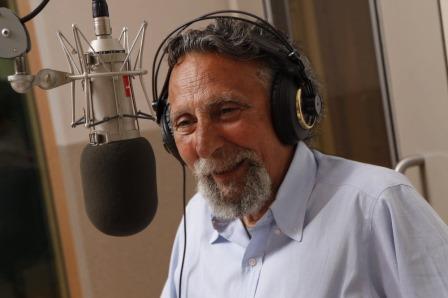
Tom was your "Average Joe," which is why so many of us could identify with him. The truth is that he had a degree from MIT and also had earned a doctorate from Boston University's Graduate School of Management. That's one smart guy -- who wore his considerable learning lightly. Not long ago I was in a pastor's office where all of his degrees were prominently on display for all to see. I told him to take them down. Not really. But I should have. Pastor friend, even if you're not humble, you can at least fake it. Andrew Murray once said that we can never reduce the size of our ego without first totally empting our spirit before God. Simply put, he said, humility is being "fully occupied with God." So wassup with dem diplomas, dudes?
12:06 PM Good to see 1 World Trade Center open for business again. If there's one thing Americans are, it's resilient. It took 13 years to get the tower back up again.

The Christian life is very similar. Sanctification, like corn, doesn't sprout up overnight. It is a process of growing into Christ. Resilience takes work, dedication, sacrifice, and especially a lot of time. I should know. I'm learning resilience on steroids. Winning the battle over sorrow and discouragement takes time and lots of it. Exasperating as it is, growth in holiness is not like cooking oatmeal. It's like harvesting a crop. You reap what you sow. As someone has put it, when you're up to your ears in alligators it's kinda hard to remember that your main objective was to drain the swamp. But if the Christian life didn't involve perseverance, I wonder if it would truly be worth it. Friend, don't look for a miracle when it comes to sanctification, because holiness can't be attained by heroics or antics. It takes time.
10:18 AM David Allen on preaching Hebrews ... from Hebrews. Excellent advice. Now if he could only get the authorship thing right. :-)
10:14 AM Love my donks.
10:04 AM 2015's Society for New Testament Studies (SNTS) meeting will be in Amsterdam, July 28-31. Praying about going this year. I love the Netherlands. Would enjoy visiting the Anne Frank House again as well as the home where Corrie ten Boom lived.

9:28 AM Calling all Ph.D. students! Need to improve your Deutsch? Care to add to your list of German vocabulary words? I've got just the solution.
8:42 AM David deSilva gives a YouTube lecture on the LXX. He discusses manuscripts, the nomina sacra, the origin of the LXX, the Letter of Aristeas, Philo's Life of Moses, translation shifts in meaning, ideological shifts in translation, and the use of the LXX in the New Testament. Excellent!
8:36 AM Jacob Cerone has begun reviewing Rod Decker's new Greek grammar. For the latest, go here.
8:32 AM Just watched the Spanish YouTube lecture posted by Thomas Hudgins. Loved the burp at 1:21.
8:20 AM Quote of the day #2 (Henry Neufeld):
I have been in churches that claimed to be totally led by the Spirit, and to ignore human hierarchy, but at the same time have as rigid a structure in reality as you could imagine. On the other hand I have seen churches with a full list of titled offices where people exhibited humility and servant leadership all the way.
I think we would do well to do away with titles, but I agree that the reality is more important than the label.
I couldn't agree more.
David Alan Black, B.A., M.Div., D. Theol. (magna cum laude, Basel), the Dr. M. O. Owens Jr. Chair of New Testament Studies, Professor of New Testament and Greek, the Right Reverend Master of all Things Divine, and Sehr Geehrter Herr Professor Doktor der Theologie. (Not to mention a real humble guy.)
7:58 AM Quote of the day (Allan Bevere):
The task of preaching is more than prophetic, but it is necessarily prophetic as well. Historically, prophetic preaching got the preachers in trouble. If prophetic preaching has made you popular with your church, you are preaching to the wrong crowd.
Being a prophet may be exciting but it usually means you end up living in a cave.
Sunday, November 2
6:10 PM Today has been a day of recollection and introspection. It's also been a day of reflection on the future. Points to ponder:
1) Revivals. I've been "preaching revivals" for over 20 years in various churches, large and small. I used to accept any old invitation that came along. Not any more. I want to learn how to work smarter and not just harder. Some of the revivals I've spoken at have been great. Others have been abysmal flops, a complete waste of my time. I will no longer accept an invitation to speak at your church without first having a long conversation with you about your congregation. I want to know if it is committed not only to knowing but to obeying biblical truth. I want to know who has spoken in your church recently and how well their messages were received. I especially want to know how you handle the closings of the services. I can't tell you how many revival services I've been in where the pastor can't conclude the meeting fast enough. A quick hymn and a closing prayer and we're done. Thankfully, I've been in a few churches where the pastor himself responds to truth and spends time exhorting and encouraging his congregation. Lasting change is built by laying stone on stone. It takes dedication, commitment, sacrifice, and especially team work. I'm looking for pastors who will partner with me in getting the message across. Just this past week I spent an hour on the phone with a pastor in South Carolina who invited me by email to speak at a revival at his church in South Carolina in March. I think he got the surprise of his life when I called him and asked him some pretty hard questions. A tough decision? Yes. The bottom line is that I will be much more selective with invitations that come my way this year. I want, as Steven Covey would put it, to "begin with the end in mind."
2) Writing. The fact that I love writing doesn't mean that I need to write another book. In fact, I have said no to many invitations to publish this book or that. I have even turned down offers to write commentaries on Hebrews and Philippians, two of my favorite books. I want to write better, and write more about what I love. At the risk of belaboring the obvious, life is too short to write things you don't like.
3) People. I need to be wiser about my associations, think long and hard about the people I bump into. Who can I have the most influence on? Whose hearts are soft toward the love and saving grace of Christ? Whom can I help toward heaven? As C. S. Lewis once wrote:
It is a serious thing to live in a society of possible gods and goddesses, to remember that the dullest and most uninteresting person you talk to may one day be a creature which, if you saw it now, you would be strongly tempted to worship. Of else he may be a horror and corruption such as you meet now, if at all, only in a nightmare. All day long we are, in some degree, helping each other to one or the other of these destinations.
Again, life is too short to waste my time and energy on people who are not committed to a genuine relationship with me. Becky could see through a person with much greater clarity than I ever could. I tend to be naive, accepting people at face value. That can be virtuous at times but disastrous at others. Recent experience has borne that out.
4) Carrying on. Christ entrusted His followers with an assignment before He returned to heaven. When He left earth He did not vacate the planet but left us, His followers behind, to serve in His place, to speak for Him, to love others with His love. Becky's death a year ago is a reminder to me that life is a journey that's homeward bound. We live as pilgrims, and we must be willing to leave our loved ones, our securities, even our family and friends to live out of a suitcase and to sleep anywhere but in our own beds for the sake of eternity. That's what being a Christian is all about. It's being willing to give the Gospel the time and effort it demands, even when it is inconvenient. Honestly, I can't wait for the return of Jesus. Everything would be so much better if The Day would just happen! Christ desires that we live each day as if His coming were imminent. So we must work, and work hard, believing with all of our hearts that God will complete the work and even make it flourish since He is the One who began it in us. I must leave my feelings of inadequacy and inferiority behind. I am a priceless diamond in the rough. God is working away at me with slow, precise strokes, so that I may become a useful vessel in His hands. Obstacles and horrible circumstances will not prevent Him from completing the job. Praise His name!
So what about you? Take some time to write down what you think are areas on which the Great Sculptor needs to do some fine tuning.
10:40 AM What can I say exactly one year after Becky's death? Well, I can't think of an event or decision that marked a turning point or major breakthrough. God, however, has sustained me and perhaps has even grown me (though about as slowly as a hardwood tree). Long before Becky died we would talk about what life would be like without her. We talked about how I would take care of the children and the grandkids. We discussed the farm and the houses. We talked about how I would continue her vision for a retreat ministry on the farm. She assured me I would quickly find another spouse, to which I replied, "No one would be crazy enough to marry me!" In fact, I've decided to continue to wear my wedding ring and to pour my energy into our children and grandchildren. I have found tremendous joy and satisfaction in functioning as a single parent.
Before she died, Becky and I would often discuss our life together. We recalled the vivid memories of our numerous family vacations, pulling our battered tent trailer. We talked about our dating years at Biola. I have several pictures of Becky from that time. One of them shows her tall and strong and beautiful.
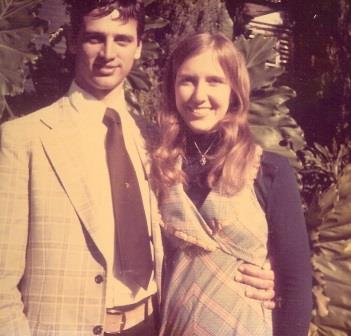
How did we get so old so quick? I ask myself. Wasn't it just yesterday that I kissed her for the first time? I carry a vivid memory of us at the DMV getting her a personalized license plate for the van we had bought in anticipation of all the trips we would have to make to UNC after her diagnosis. ITIZWEL is what she chose. It is this paradox -- knowing that all is well even when everything is going wrong -- that I want to continue to explore in the days and years ahead. There is only so much I can write about our extraordinary life together, except to remind myself just how normal it was. Our marriage endured the same struggles yours has; we've had to adjust to severe losses that swept over us like a tsunami; we've had to choose, over and over again, to trust that God was still God, however miserable we may have felt at the time. Since Becky's death I've discovered that I had no power to control the circumstances of my life. Her passing was completely beyond my control. But I also discovered after her death that I still had the ability to choose how I would respond to providential interruptions in my life. As it turned out, I have been "surprised by joy" (to borrow a phrase from C. S. Lewis). I have found a new post-Becky existence that is truly good. Of course, today memories are flooding my mind. No words can describe my emotions when Becky breathed her last. Oddly enough, the predominant emotion was joy -- pure, unadulterated joy that my Becky was finally Home, was finally doing what she had been planning to do for so many months -- kiss the feet of her Savior. I remember praying with the family, and then I spent time alone with her in our bedroom. I poured out my soul to God in thanksgiving and praise that He had carried her over the finish line.
That was a year ago. Today, I've had to grow into singleness, to learn to wear it like a new suit. But I like the fit. I can't imagine being married to anyone but Becky. Perhaps the supreme challenge to anyone who has lost a spouse involves facing your grief on the one hand and learning to live with a heart of gratitude on the other. Death diminishes us, but it also holds the power to transform us. Above all, it can lead us to the One who holds in His hands the keys of life and death. As much as I love blogging, the final word does not belong to me. There is another and greater Word that overpowers my feeble words. A year ago today my Becky -- our Becky -- entered heaven and joined all those who died before her. She is in heaven, not because of all of the good works she performed (for which she is justly famous). She is in heaven because she believed in Jesus, who died and rose again for her sake. And that is something we can all truly be grateful for.
And so I have both struggled and triumphed this past year. Music has helped me a great deal. So have writing and traveling. In the months immediately after Becky's death I drew great courage from your emails, and still do. The internet is a pure gift of grace to me. It joins brokenness and love together. In it I have found a community that cares for hurting people like me. For a year I have been totally honest with this community. I am terrified by my transparency, yet I cannot imagine how I could have made it through the year without blogging about my journey. Will my future blog posts be any different? I've always thought that the one year anniversary would mark a major turning point, a milestone of sorts. I don't know if that is true. I don't know what the future holds. I still live very much in the present, which is still full of sorrow and pain. Like anyone who suffers from loss, I feel a need to redeem the experience, to leverage the loss for something good, to use it to bless others. Death is not the victor. It never will be. Despite the grief, there is always a measure of peace. It has taken me a year, but I am finally beginning to believe that God's sovereign decision to take Becky to heaven when He did was a blessing and not a curse. Last night, as I lay sleepless in bed, I realized again that I have a choice as to whether or not I will trust God. A real relationship can never be forced. God gives me the freedom to draw closer to Him or to turn away from Him. The only reason I have chosen to run toward God is a man named Jesus, who felt and feels my pain as no one else ever could, who shows me that God understands suffering because God suffered too. I have come to see that I can acknowledge the pain of Becky's death with tears and still be a real man, still trust God's sovereignty, still cast my cares upon Him. Even when I feel like a granite wall stands between me and Him, I know He is there. Even when I am crushed by sorrow and yell at Him to take away my pain, I know that He cares. Jesus changes everything. Whenever I ask myself, "How could God have allowed such a terrible thing to happen to me?" all I have to do is remember the Gospel, for the Gospel reminds me that loss is not merely the ending of something good but the beginning of something good as well. The Gospel can give us more than we could ever deserve. It will give us life, even in our suffering.
P.S. I'll be watching this beautiful service today.
P.P.S. Last night was a blast. Here are a few memories:
1) My good friend Friesh who runs The Queen of Sheba.
2) Poor Friesh. Our family basically took over her whole restaurant.
3) A daughters pic. Each one is precious to me.
4) Let's see, who is taller ?
5) Grandkids galore.
6) Graham loves his Papa B.
7) He also loves injera b'wat!
8) Kim and Matthea.
9) I love my Nolan!
Saturday, November 1
3:40 PM About to leave for dinner at the Queen of Sheba in Chapel Hill. There will be 28 of us. What fun!
Pix from Nathan's camera:
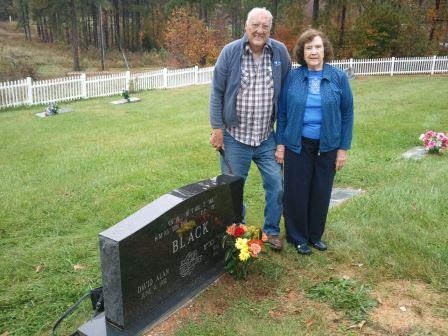
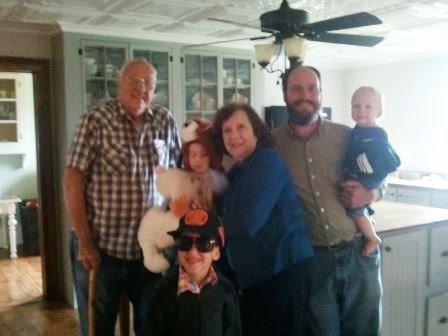
10:48 AM Nate just took his grandparents to the graveside, and from there they will go to his house for lunch with Jessie and the boys. This morning mom said to me, "Give me a hug, honey" and we just stood there in the kitchen and wept on each other's shoulders. Becky was so much like her mother. So glad she and dad are still able to travel. Their presence means a lot to me this weekend.
Thanks for all of your emails this morning. A small sampling:
Know that Julie and I are in "the flock of geese" alongside you and your family, especially throughout this weekend.
Words seem so inadequate when I admit that I have not suffered the kind of grief that you have...I have no idea what to say. Just know that over the last few years as I have followed your blog (with your and Becky's writings) I have been eternally blessed.
Just a quick note to say that we are praying for you today.
Praying you will see this bright and early in the morning. You are loved, prayed for and appreciated beyond measure!
Small acts of kindness, but with huge consequences. Again, thank you.
8:54 AM So where do I begin?
I have to admit I'm more scared about this weekend than just about any weekend I've ever faced. I tell you, it can by mighty painful, this losing someone who took away your independence, this person whom God literally joined you together with, immolating you on the altar of love. I feel my lips beginning to tremble just thinking about her. How in the world do I describe her? Well, I've decided to throw caution to the winds and give it a try.
I married Becky because I was created to be a relational being. That's why there were Adam and Eve in the Garden. They were not merely two people who "knew" each other. They were one flesh, and you could no more separate them without destroying both of them than you could separate a sheet of plywood without ripping it to shreds. Marriage exploits the fact that we humans were made for community, for sharing the deep things of life. The act of sex is only a small aspect of this relationship. Becky and I enjoyed, as it were, a hypostatic union involving our whole beings. Above all, thanks to the mercy and grace of God, we shared a common goal in life. The work God gave us to do needed both of us, and we complemented each other like hand and glove, like white chalk on a black board. If she was yin, I was yang. If she was the chili, I was the cheese. If she was the rubber, I was the road. If she was poetry, I was prose. If she was heads, I was tails. Unified ourselves, our main job in life was drawing people together in unity first with their Creator and then with each other. In the 40 years that I knew her, I never ceased being stunned by her absolute beauty. When I held her head in my lap and moved my hands over her soft, freckled skin, I would drink in all the complexities of God's creative handiwork. And yet, as complex and beautiful as Becky was on the outside, she was incomparably more beautiful on the inside. Even in death, even at the tragic ending of an otherwise happy story, she was Becky: strong, compliant, totally yielded to her Savior, determined to make the best of it. It was as if she was telling those present in words deeper than sounds, "In even your direst needs you can trust our loving Savior." At that very moment, the second she drew her final breath, I knew that her spirit would live on forever in my life, our lives, and that every time I was tempted to twist myself into the narrow box of ego, Becky would be there, pointing the way to the cross.
In 37 years of marriage, we grew more and more like each other. Now if that isn't scary! Even today I find myself saying things that Becky would have said or counseling my daughters in words that Becky would have uttered. Marriage evens out our differences and draws us into an odd, otherworldly kind of togetherness where you really do become "one." This is an overwhelming reality that I've had to come to grips with since Becky's passing. No, I am no longer married to Becky. But I live as though I am, in many ways. I still do not squeeze the toothpaste from the top, I still take out the trash as though she was there reminding me to do, I still replace the toilet paper so that the sheets roll down and not under, I still wear my wedding ring. It is this unrelenting personalness of marriage that one cannot escape. Just as marriage gives face to unspeakable joy, so it also gives face to unbelievable suffering. Not only does marriage fail to mitigate the struggles of life, it exacerbates them. And just because your spouse is no longer living doesn't mean that you have stopped being delimited and informed by that other person. Marriage always involves a drastic course of action, not least when one of the spouses dies. It cannot succeed without a compete and utter attitude of acceptance. Death is the fate of all of us, and should your spouse die before you do, you dare not harden your heart or let your love grow cold. There are still many others who depend on your loving faithfulness, your constancy, your selflessness, your support, and your resources. You are no longer surrendering all of this to your mate, true, but in a sense you are surrendering it to others in her honor, in her memory, always with her presence and influence in the back of your mind. Just as you and your wife, bound together in pure love, learned to give away that love, even to give yourselves freely away, so you continue to give yourself away to others, motivated solely by love. Whereas I could once look with love into the eyes of my wife, now I can look with love into the eyes of my parents, my children, my grandchildren, loved ones, friends, even enemies. That, in fact, is exactly the meaning of marriage. Marriage teaches us that love is the only true power in this world, is the only thing that can truly change lives. More and more, as time goes on, marriage in our society is being asked to stand alone, to become the symbol of righteousness and Biblical fidelity, the sole yardstick of the Christian faith, when in fact it is so much more than that. There is nothing in this world less lovely than marriage without compassion, without the ability to enter into the hell of what others are experiencing simply because they do not know what God's standards are for marriage. Divorce exposes the hypocrisies and falsehoods of modern evangelicalism like nothing else, for while we are condemning others for improper and ungodly commitments we ourselves are failing miserably to pay the cost of total commitment. Marriage, even Christian marriage, has a high dropout rate. This is why Christian marriage is so important today. It says to a watching, hurting world, "Just as each of you is capable of being loved by another human being, so each of you is marvelously, radically, sacrificially, and perfectly loved by God."
And so I end where I began. To be married is to receive a precious gift from God. But it is not the most precious gift He can give us. Even if you should lose a husband or a wife through death (or divorce), He is there, and He will never leave you nor forsake you. Our spouses may leave us, but God never can. Marriage is like that giant California earthquake Becky and I once experienced: it shakes you right off the faulty foundation you established for yourselves and relocates the center of your universe. You begin to say with Paul, "For to me to go on living is Christ, and to die is gain." No one else loves us as He does, and we will never find a Friend as true as He.
Notes in the margin:
1) Mom and dad arrived safely from Dallas last night.
2) Here they are on their way to "Utopia" (as dad calls Ethiopia) 60 years ago with their eldest daughter Becky Lynn. My, how times flies.
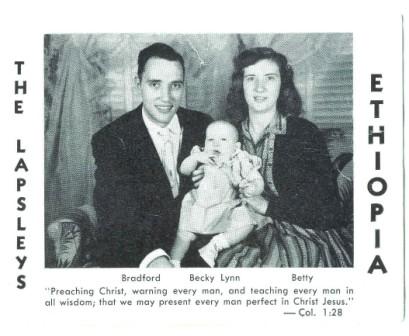
3) These flowers will be laid at Becky's grave today.
4) Becky's spirit lives on in the retreat ministry she established here on the farm. One couple who stayed here recently left this note. It reads, in part:
Words can not even begin to express the pleasure it was to be here these last few days. It has been the perfect blend of time to reflect and look ahead. The Lord has impressed on our hearts with what it means to live each day intentionally.... Thank you for sharing your home and life with us and all those who will enter this beautiful place.
I have to think that Becky would be mighty pleased with these words if she could read them.
